SCHOOL OF LAW
Bulletin 2011-2013
University o/SanDiego

LD 4881 . S1565
A536 2011-13
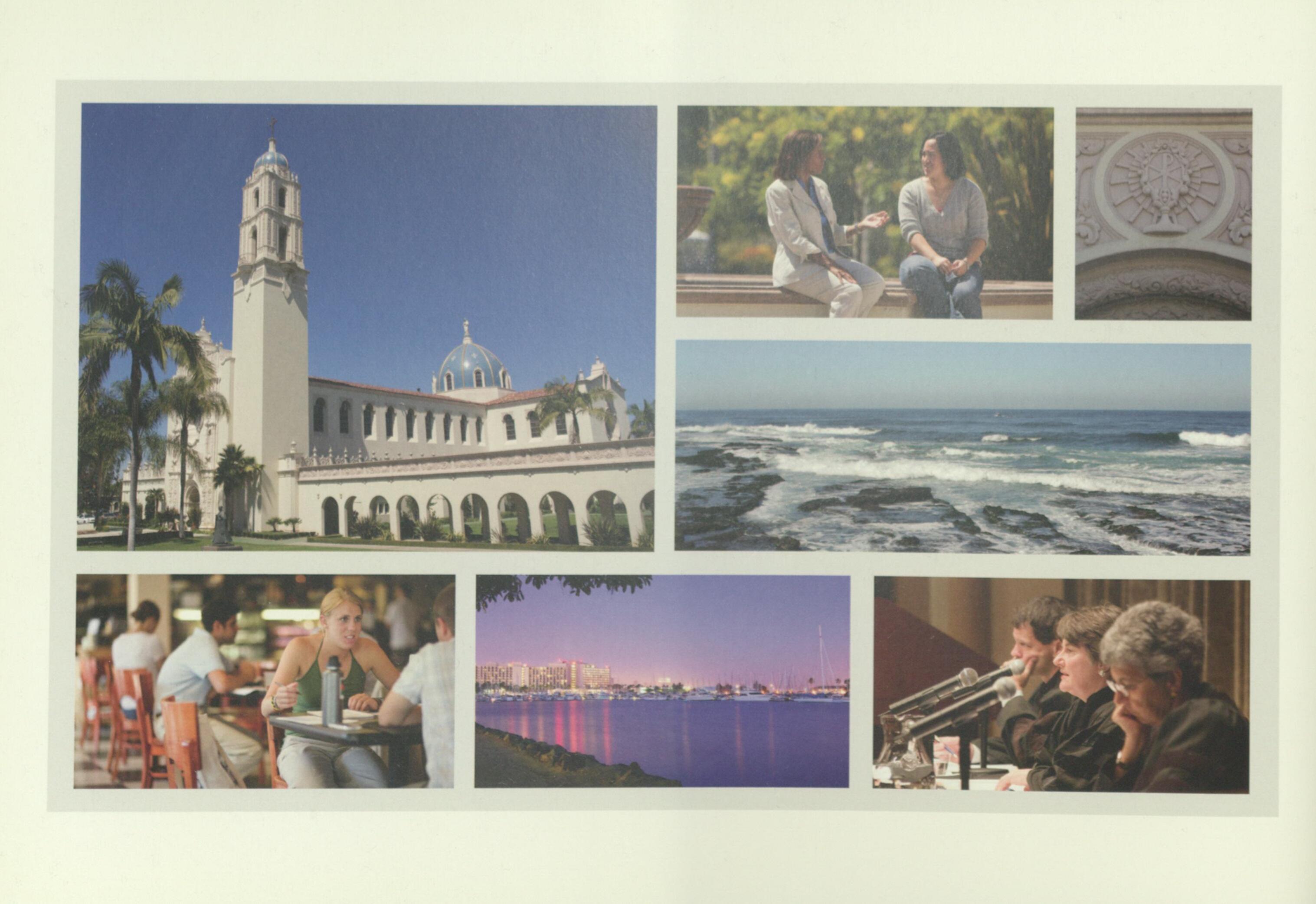


TABLE OF CONTENTS | University of San Diego | 2009-2011 BULLETIN PSfJFi1 n ; 1 CHAPTER 1 | Opening Doors 6 What career options are available for people with law degrees? 8 Meet some of our current students 10 Why should you choose the University of San Diego School of Law? 12 What degree programs are offered at USD School of Law? 14 What will 1 study in my first year as aJ.D. candidate? 15 Description of first-year J D. courses 16 What happens in the second, third and fourth year? 17 What courses are offered after my first year of law school? 18 Can 1 focus on one key practice area at USD? 20 Learn from leaders in their field CHAPTER 2 | Dig in Deeper 26 Hands-on legal experience 28 Centers &r Institutes 30 Summer Abroad Programs 32 Moot Court & Mock Trial Competitions 34 Law Reviews &Journals 36 Student Organizations CHAPTER 3 | In Good Company 44 Incoming Students: List of Universities 46 Graduate Employment Statistics 48 Graduate Global Location Statistics 50 Meet some of our top alumni 53 How can alumni help me?

CHAPTER 4 | Casts & Financial Assistance CHAPTER 5 | Getting Here CHAPTER 6 | The Fine Print 56 How much does it cost to attend USD School of Law? 60 How do 1 apply to USD School of Law? 66 Registration 56 Can I afford law school? 62 What is the Flex section? 66 Registration with the California State Bar 56 What types of financial aid are available at USD? 62 Does USD offer an early decision option? 66 Examinations and Grading 56 What is work-study? 62 Can 1 reactivate a previous application? 67 Honors 56 What are service grants? 62 Can I apply to be a visiting summerstudent? 67 Academic Standards, Probation, 57 Who is considered for financial aid? 62 What if 1 am a transfer or visiting student? Disqualification and Readmission 57 How many students receive financial aid at USD? 62 Do 1 need to take the TOEFL? 67 Reservation of Right to Modify Academic Rules 57 How do I apply for financial aid? 63 What if my undergraduate degree is from another country? 67 Adding or Dropping Courses 57 How do I know if I received financial aid at USD? 63 Did I get accepted? 67 Leave of Absence 57 Are admission decisions linked with financial aid decisions? 63 How do register for classes? 67 Withdrawal from the School of Law
Can I defer my undergraduate loans while attending lawschool?
What's the refund policy at USD School of Law?
Where can I leam more about financial aid?
57
63
57
CHAPTER 1
Opening Doors


What career options are available for people with law degrees?
The legal credentials and analytic skills you develop in law school are valued well beyond the traditional legal field. Choose from a wide variety of career options: shape future laws, provide legal services to underserved communities or advise individual and/or corporate clients. A law degree can also be a stepping stone to politics, real estate, entrepreneurship or leading a business. Choosing to attend law school today gives you the flexibility to choose from many prestigious careers.

CHAPTER 1 | Opening Doors
Each year, the University of San Diego School of Law welcomes more than 300 of the brightest students from across the country and around the world. Our goal is to provide you with the academic experience you need—both inside and outside the classroom walls—to help you thrive in your chosen career. Here, you will receive theoretical knowledge and practical training to prepare you to work within the professions of tomorrow.

Meet some of our current students.
My name is Lauren Hargrove. I'm here to study corporate and real estate law.
"Finding balance in law school is difficult, but faculty and students at USD make it a little easier. They realize that you are more than just your resume and encourage personal growth in all areas "
What is the best thing that has happened to you while attending USD? The Career Servicesoffice helped me obtain a community service grant that supported my internship with Housing Opportunities Collaborative,a non-profit organization of pro bono legal professionals who provide free legal consultation for homeowners facing foreclosure. The internship gave me valuable experience in property law, allowed me to serve the community and expanded my professional network.
Bachelor's degree: B.B.A., Marketing, and B.A., Mass Media Communications, University of San Diego, 2004

Hometown: San Diego, Calif.
Dream job: International real estate and business attorney for a major hotel management chain
Learn more: law sandiego.edu/hargrove
When / was deciding whether or not to applvforlaw school, I sat in on a class at USD to see if it was a good fit for me. After that class, I knew I wanted to attend law school, and I knew it had to be USD."
How hard is law school? Is it more or less work than you thought? The first semester of law school is like watching a mo\ ie thats half way finished in a different language.. .without subtitles. And then you re asked to write a summary of that movie for your entire grade. The first year is challenging. The reading is intense, but once you get used to the language and nuance, it not only becomes doable but also exciting.
Bachelor s degree: B.A. Psychology, University of Texas at Austin, 2003
Hometown: Dallas, Texas
Dream job:Judge
Learn more: iw.sandiego.edu/ebrahimi
CHAPTER 1 | Opening Doors
My name is Arash Ebrahimi. I'm here to study constitutional law, criminal defense and civi/ litigation.
My name is Joy Utomi. I'm here to study criminal law and litigation.
"Coming to USD law was oneof the best decisions I've ever made. The camaraderie of the students, the quality of the professors and the quantity of resources has helped me enjoy every second of what would have been an otherwise unbearable journey."
What is some of vonr previous professional experience? How did that experience help you decide to go to law school? Before law school. I was a news producer at a major network affiliate. It was hard work with long hours, but it was also exhilaratingand a great fast-paced environment to work in. Working in the news media for two years made me realize that everything revolves around the law. Consumer rights, business dealings, politics, health care...everything. I realized that if I wanted to have an impact in the world, I needed to know the laws that govern it.
Bachelor's degree: B.A., Political Science and Communications, Loyola Marymount University, 2005
Hometown: Las Vegas, Nev
Dream job: Judge; host of my own legal commentary program
Learn more: law sandiego.edu/utomi
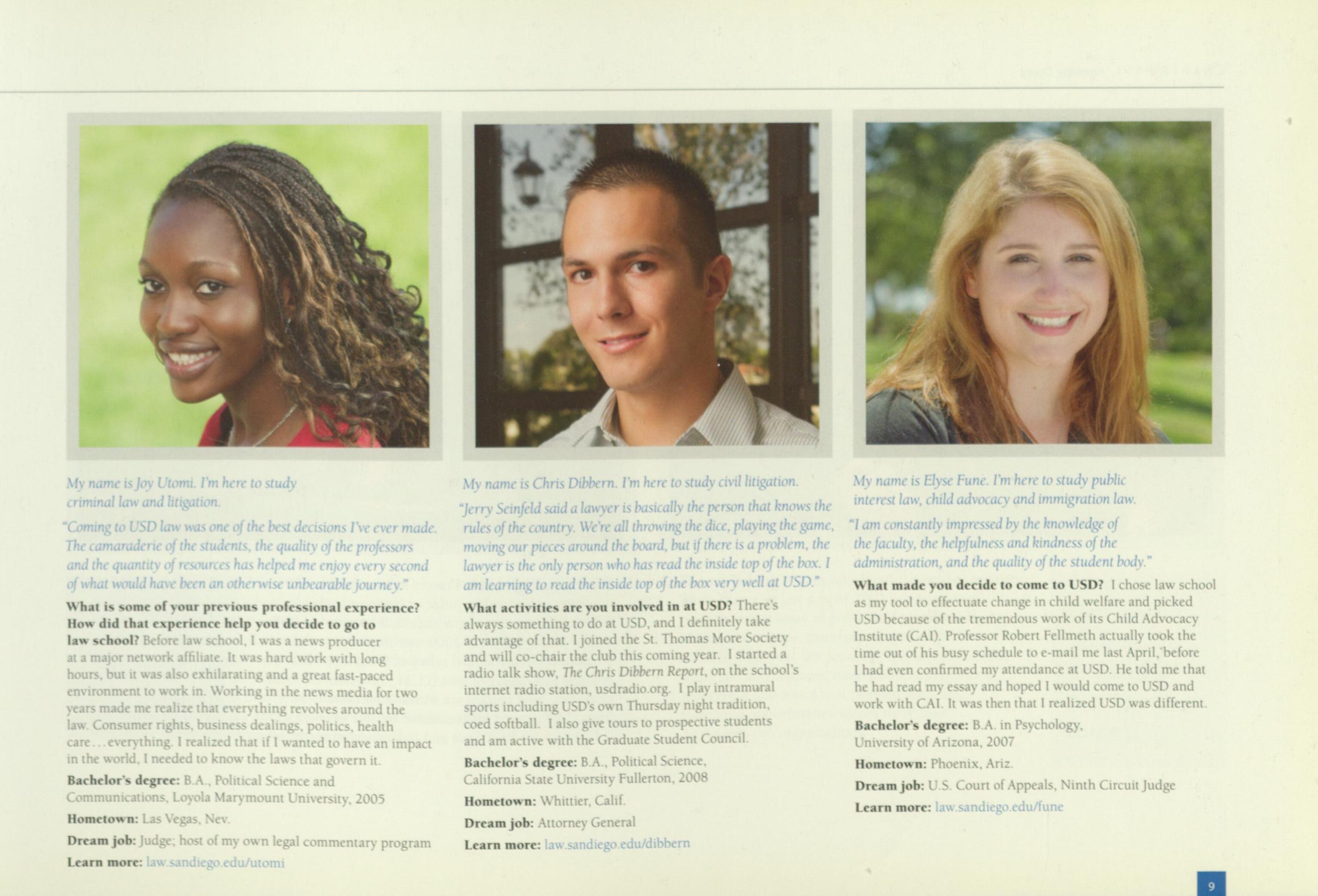
"Jerty Seinfeld said a lawyer is basically the person that knows the rules of the country. We're all throwing the dice, playing the game, moving our pieces around the board, but if there is a problem, the lawyer is the only person who has read the inside top of the box. I am learning to read the inside top of the box very well at USD. What activities are you involved in at USD? There's always somethingto do at USD, and I definitely take advantage of that. 1 joined the St. Thomas More Society and will co-chair the club this coming year. I started a radio talk show. The Chris Dibbern Report, on the schools internet radio station, usdradio.org. 1 play intramural sports including USD'sown Thursday night tradition, coed softball. 1 also give tours to prospective students and am active with the Graduate Student Council.
Bachelor's degree: B.A., Political Science, California State University Fullerton, 2008
Hometown: Whittier, Calif
Dream job: Attorney General Learn more: iw.sandiego.edu/dibbern
My name is Elyse Fune. I'm here to study public interest law, child advocacy and immigration law.
"I am constantly impressed by the knowledge of the faculty, the helpfulness and kindness of the administration, and the quality of the student body."
What made you decide to come to USD? I chose law school as my tool to effectuate change in child welfare and picked USD because of the tremendous work of its Child Advocacy Institute (CA1). Professor Robert Fellmeth actually took the time out of his busy schedule to e-mail me last April, before I had even confirmed my attendance at USD. He told me that he had read my essay and hoped I would come to USD and work with CAL It was then that 1 realized USD was different.
Bachelor's degree: B.A in Psychology, University of Arizona, 2007
Hometown: Phoenix, Ariz.
Dream job: U.S. Court of Appeals, Ninth Circuit Judge Learn more: law sandiego edu/fune
My name is Chris Dibbern. I'm here to study civil litigation.
Why should you choose the University of San Diego School of Law?
1. You are looking to have a career as a top lawyer, advocate, policy maker, judge or business leader. Within nine months of graduation, 94 percent of USD School of Law's Class of 2009 was employed with a reported average annual salary of $94,859 or was enrolled in a master of laws (LL.M.) program. Of those graduates, 59.4 percent are working for private law firms, 13.4 percent for businesses outside of law, and 9.1 percent for local, state and federal government.

CHAPTER 1 | Opening Doors
Here, our sought-after graduates are employed.
2. You are looking to study law with internationally renowned faculty. USD School of Law's professors are leading scholars and teachers of business and Hd'C OUI" corporate law, climate and energy law, criminal law, ' environmental law, family and child law, international Students ICCLVTI and comparative law, intellectual property law, frnrr the best jurisprudence and legal theory, labor and employment J law, litigation, public law and policy and tax law. Our professors are international leaders in their fields.
You are looking to gain valuable real-world experience while attending law school. USD School of Law provides a vast array of public and corporate legal clinics, internships, extemships, clerkships, editorial positions, law journals, specialized summer study abroad programs, national and international moot coun and mock trial competitions, and leadership opportunities within more than 30 student-run organizations.

Here, our students are prepared/or prestigious careers.
What degree programs are offered at the University of San Diego School of Law?

Juris Doctor (J-D.)
Juris Doctor and Master of Business Administration (J.D./M.B.A.)
Juris Doctor and International Master of Business Administration (I.M.B.A./J.D.)
Juris Doctor and Master of Arts in International Relations (J.D./M.A.)
Juris Doctor and Master of Laws in Taxation (J.D./LL.M.)
General Master of Laws (LL.M.) with concentration
Master of Laws (LL.M.) in Business and Corporate Law
Master of Laws (LL.M.) in Comparative Law (for international attorneys)
Master of Laws (LL.M.) in International Law
Master of Laws (LL.M.) in Taxation
Master of Science (M.S.) in Legal Studies
CHAPTER 1 | Opening Doors
Juris Doctor (J.D.) Program
The J.D. program at USD School of Law introduces you to the basic areas of law in the first year and then allows you in following years to shape the curriculum to meet your career goals and intellectual interests.
Our full-time J.D. program, which generally requires three full academic years in residence to complete, is our most popular. For professionals who have full-time careers, we also offer a pan-time J.D. program, which generally requires four years to complete. Classes for pan-time students usually begin at 5:30 p.m. during the week. Pan-time students can transfer to the full-time program after completing the first academic year.
A seven-week summer program for full-time and pan-time students is also available. Completing summersession means a lighter class load during the subsequent semester. Summer sessions also make it possible to transition from pan-time to full-lime programs.
Here, your schedule can be flexible.
For mote detailed information about ourJ.D. Programs, go to law.sandicgo.edu/jd
Concurrent Programs (J.D./M.B.A, I.M B.A and M.A.)
Pursue two degrees at once with USD's choice of concurrent programs. Select courses are credited to both the J.D. degree and one of three master's degrees, saving you one semester of time and expense. Concurrent degrees offer the pursuit of a J.D. degree along with a master of business administration (M.B.A.), an international master of business administration (i.M.B.A.) or a master of arts in international relations (M.A.).
For more detailed information about our concurrent degree programs, go to law.sandiego.edu/concurrent
Master of Laws Programs
Are you an attorney, judge, law professor or recent law school graduate looking to take the next step?
The University of San Diego School of Law LL.M. programs provide a diverse, academic atmosphere where the brightest legal minds can engage in intellectual dialogue from a wide variety of perspectives.
Here, you can specialize.
General LL.M. with Concentration
Specialize in a particular area of study with the General LL.M. Program, which provides additional education in select fields such as criminal law, environmental law, health care law, intellectual property or labor and employment law. The degree is ideal for attorneys seeking in-depth training in an area of law in which they currently practice, as well as for those seeking to develop a new area of practice.
LLM. in Business & Corporate Law
Expand or change your existing practice with the LL.M. in Business & Corporate Law Program, which offers the opportunity to specialize in complex business transactions such as corporate finance, intellectual property and international transactions.
LLM. in Comparative Law
For more than 30 years, USD School of Law has afforded foreign-educated attorneys the opportunity to study law in one of the most beautiful cities in the United States. Graduates of this program return to practice in their home countries with a comprehensive understanding of American law and policy.
LLM. in International Law
The LL.M. in International Law Program offers law school graduates from the United States a unique opportunity to study international law in a dynamic, multicultural city that is home to the world's busiest international border crossing. You'll join students from
private, public and government practices who are seeking expertise in international business, human rights, immigration and other global legal issues. Enriching this academic experience is the opportunity to study side-by-side with attorneys, judges and government officials from around the world enrolled in our LL.M. in Comparative Law Program.
LL.M. in Taxation
The oldest of its kind on the west coast, the Graduate Tax Program at the law school provides you with the theoretical and practical framework to become skilled leaders in the field of tax law. By spending just one additional semester at USD School of Law after completing your J.D., you can earn an LL.M. in taxation.
For more detailed information about our LL.M. programs, go to law.sandiego.edu/llm

Interested law school applicants or J.D. students should contact the Graduate Law Programs office at llminfo@sandiego.cdu or (619) 260-4596 for planning and advice.
M.S. in Legal Studies
The Masters of Science (M.S.) in Legal Studies is designed for graduate students and professionals whose area of research or employment would benefit from further study of the legal system. Ideal candidates include, but are not limited to, graduate students in other disciplines (such as political science, economics, international relations, engineering, philosophy, business or medicine) or professionals from different fields (such as journalism, business, science or technology), who will benefit from studying law, but who do not wish to become attorneys.
For more detailed information about our M.S. in Legal Studies program, go to law.sandiego.edu/msls
What will I study in my first year as aJ.D. Candidate?
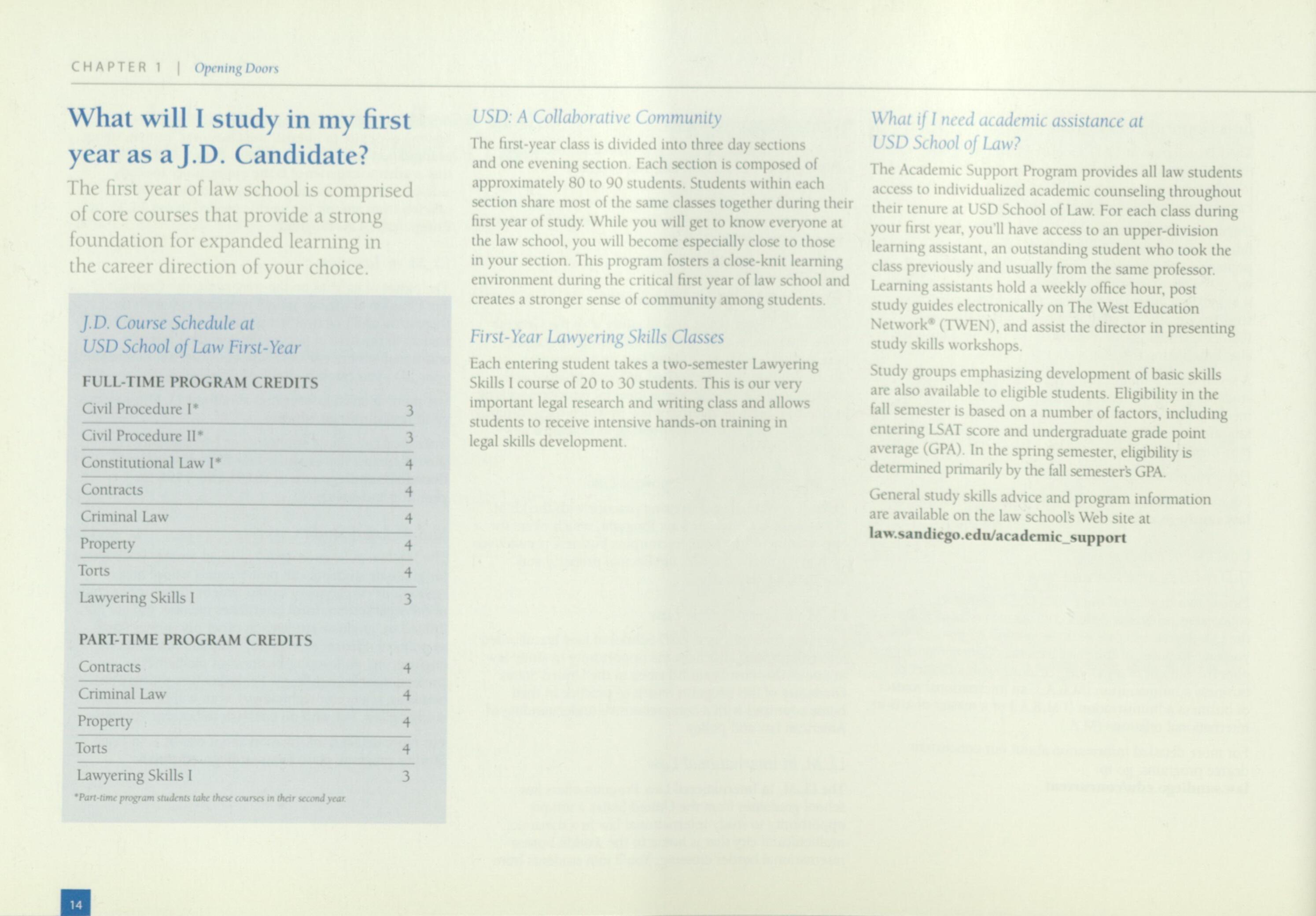
The first year of law school is comprised of core courses that provide a strong foundation for expanded learning in the career direction of your choice.
USD: A Collaborative Community
The first-year class is divided into three day sections and one evening section. Each section is composed of approximately 80 to 90students. Students within each section share most of the same classes together during their first year of study. While you will get to know everyone at the law school, you will become especially close to those in your section. This program fosters a close-knit learning environment during the critical first year of law school and creates a stronger sense of community among students.
First-Year Lawyering Skills Classes
Each entering student takes a two-semester Lawyering Skills I course of 20 to 30 students. This is our very important legal research and writing class and allows students to receive intensive hands-on training in legal skills development.
What if I need academic assistance at USD School of Law?
The Academic Support Program provides all law students access to individualized academic counseling throughout their tenure at USD School of Law. For each class during your first year, you'll have access to an upper-division learning assistant, an outstanding student who took the class previously and usually from the same professor. Learning assistants hold a weekly office hour, post study guides electronically on The West Education Network® (TWEN), and assist the director in presenting study skills workshops.
Study groups emphasizing development of basic skills are also available to eligible students. Eligibility in the fall semester is based on a number of factors, including entering LSAT score and undergraduate grade point average (GPA). In the spring semester, eligibilityis determined primarily by the fall semester's GPA.
General study skills advice and program information are available on the law school's Web site at law.sandiego.edu/acadcmic_support
CHAPTER 1 | Opening Doors
J.D. Course Schedule at USD School of Law First-Year FULL-TIME PROGRAM CREDITS Civil Procedure I* 3 Civil Procedure II* 3 Constitutional Law 1* 4 Contracts 4 Criminal Law 4 Property 4 Torts 4 Lawyering Skills I 3
PART-TIME PROGRAM CREDITS Contracts Criminal Law Property Torts Lawyering Skills I •Part-time program students take these courses in their second year. 3
Descriptions of First-YearJ.D. Courses
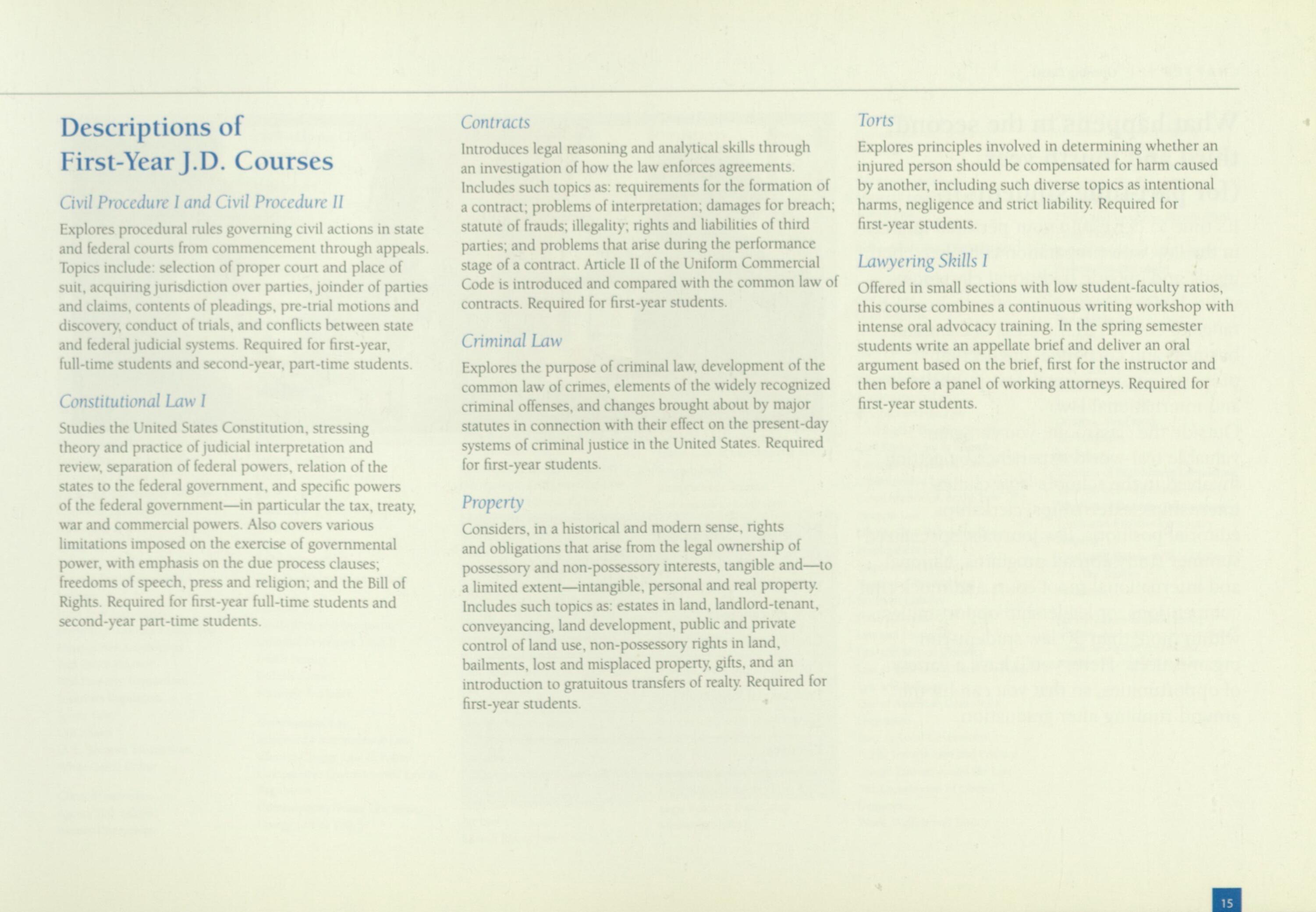
Civil Procedure I and Civil Procedure II
Explores procedural rules governing civil actions in state and federal courts from commencement through appeals. Topics include: selection of proper court and place of suit, acquiring jurisdiction over parties, joinder of parties and claims, contents of pleadings, pre-trial motions and discovery, conduct of trials, and conflicts between state and federal judicial systems. Required for first-year, full-time students and second-year, part-time students.
Constitutional Law I
Studies the United States Constitution, stressing theory and practice of judicial interpretation and review, separation of federal powers, relation of the states to the federal government, and specific powers of the federal government—in particular the tax, treaty, war and commercial powers. Also covers various limitations imposed on the exercise of governmental power, with emphasis on the due process clauses; freedoms of speech, press and religion; and the Bill of Rights. Required for first-year full-time students and second-year part-time students.
Contracts
Introduces legal reasoning and analytical skills through an investigation of how the law enforces agreements. Includes such topics as: requirements for the formation of a contract; problems of interpretation; damages for breach; statute of frauds; illegality; rights and liabilities of third parties; and problems that arise during the performance stage of a contract. Article 11of the Uniform Commercial Code is introduced and compared with the common law of contracts. Required for first-year students.
Criminal Law
Explores the purpose of criminal law, development of the common law of crimes, elements of the widely recognized criminal offenses, and changes brought about by major statutes in connection with their effect on the present-day systems of criminal justice in the United States. Required for first-year students.
Property
Considers, in a historical and modern sense, rights and obligations that arise from the legal ownership of possessory and non-possessory interests, tangible and—to a limited extent—intangible, personal and real property. Includes such topics as: estates in land, landlord-tenant, conveyancing, land development, public and private control of land use, non-possessory rights in land, bailments, lost and misplaced property, gifts, and an introduction to gratuitous transfers of realty. Required for first-year students.
Torts
Explores principles involved in determining whether an injured person should be compensated for harm caused by another, including such diverse topics as intentional harms, negligence and strict liability. Required for first-year students.
Lawyering Skills I
Offered in small sections with low student-faculty ratios, this course combines a continuous writing workshop with intense oral advocacy training. In the spring semester students write an appellate brief and deliver an oral argument based on the brief, first for the instructor and then before a panel of working attorneys. Required for first-year students.
What happens in the second, third and fourth year (for part-time students)?
It's time to delve into your personal interest in the law with preparation completed both inside and outside traditional classroom walls. USD's J.D. program offers a broad range of courses in the areas of criminal, business and corporate, intellectual property, environmental, tax, public policy and international law. Outside the classroom, you can gain valuable real-world experience by getting involved in the school's legal clinics, internships, extemships, clerkships, editorial positions, law journals, specialized summer study abroad programs, national and international moot court and mock trial competitions, or leadership opportunities within more than 30 law student-run organizations. Here, you'll have a variety of opportunities, so that you can hit the ground running after graduation.
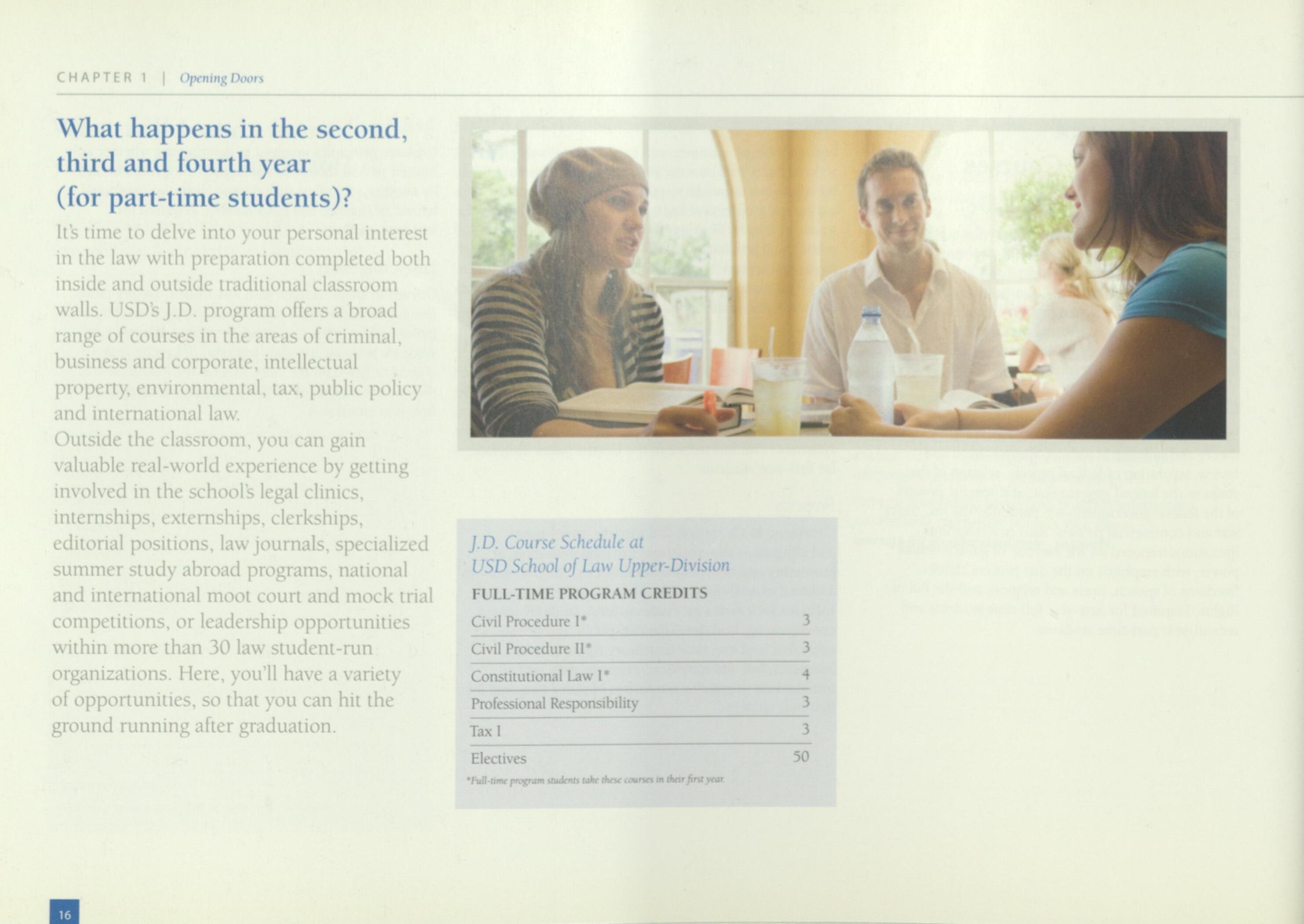
CHAPTER 1 | Opening Doors
J.D. Course Schedule at USD School of Law Upper-Division FULL-TIME PROGRAM CREDITS Civil Procedure I* 3 Civil Procedure II* 3 Constitutional Law 1* 4 Professional Responsibility 3 Tax I 3 Electives 50 •Full-time program students take these courses in their first year. m
Business, Corporate &Commercial
Advanced Secunties Regulation
Agency. Partnership & the LLC
Antitrust
Bankruptcy
Business Immigration Law
Business Planning
Business Torts
Business Transactions in the Peopled Republic of China
Contracting Across Borders
Corporate Finance
Corporate Governance Seminar
Corporate Law Seminar
Corporations
Deals
Entenainment Law-
Finance and Accounting for Lawyers
Fligh Tech Start-Ups
In-House Corporate Counseling
Mergers and Acquisitions
Real Estate Finance
Real Property Transactions
Securities Regulation
Sports Law
UCC Sales
UCC: Secured Transactions
White Collar Crime
Clinks & Internships
Agency Internships
Agency Extemships
Appellate Clinic
Child Advocacy Clinic: Delinquency
Child Advocacy- Clinic: Dependency
Child Advocacy Clinic: Policy
Civil Clinic
Corporate Counsel Internship
Criminal Ginic
Cnmmal Justice Experience
Energy Law & Policy Clinic
Entertainment, Sport & IP
Internship
Entrepreneurship Clinic
Environmental Law Clinic
Immigration Ginic
Judicial Internship Program
Land Use Ginic
Landlord Tenant Clinic
Mediation Internship
Menial Health Clinic
Public Interest Law Ginic
Small Claims Clinic
Education & Disability Clinic
State Income Tax Clinic
State Sales &Use Tax Ginic
Federal Tax Ginic
Tech Entrepreneur Law Clinic
Criminal Law
Corrections and Sentencing
Criminal Procedure 1 and II
Death Penalty Federal Crimes
Scientific Evidence
Environmental Law
Advanced Environmental Law
Gimate Change Law & Policy'
Comparative Environmental Law & Regulation
Contemporary Water Law Issues
Energy Law & Policy
Environmental Law
Environmental Law Seminar
Land Use Planning
Public Land & Natural Resource
Family &Child
Child Rights and Remedies
Education Law-
Family Law
International &Comparative Law
European Commercial Law-
European Legal Cultures
European Union Law
Foreign Relations Law-
Global Constitutionalism
International Arbitration
International Business Ethics
International Business Transactions
International Civil Litigation
International Contracts
International Energy Regulation
International Environmental Law-
International Human Rights
International Intellectual Property
International Investment - Legal Issues
International Negotiation
International Organizations
International Redress for Human Injustice
International Sales Transactions
International Trade Law-
Latin American Law & Institutions
Law of the Sea
Mexican Law-
Mexican Legal Spanish
NAFTA (North American Fee-Trade Agreement)
Public International Law
Intellectual Property &Technology' Law
Art Law-
Biotech Patent Law-
Constitution and the Internet
Copyright Law
Corporate Innovation
Cyberspace Law-
Intellectual Property Survey
Intellectual Property & Antitrust
Intellectual Property Strategies
Intellectual Property Theory
Seminar
International Intellectual PropertyPatent Law
Patent Law Theory Seminar
Patent Litigation 1 &r II
Property
Trade Secrets
Tech Transfers Legal Practice
Trademarks
Trademark Seminar
Jurisprudence & Theory
Ethics. Law & International Affairs
Jurisprudence
Jurisprudence Seminar
Law and Socio-Economics
Litigation. Practice & Procedure
Advanced Legal Research
Advanced Trial AdvocacyAlternative Dispute Resolution
California Civil Procedure
Civil Practicum
Complex Litigation
Conflict of Laws
Evidence
Evidence Advocacy Lab
Federal Courts
Interviewing and Counseling
Judicial Lawmaking
Labor Law
Lawyering Skills II
Legal Ethics Seminar
Legal Research Boot Camp
Mediation Skills
Negotiation
Products Liability Seminar
Remedies
Other Law Courses
Advanced Legal Writing
Animal Law
Consumer Law
Independent Supervised Research
Law and Literature
Law and the Brain
Law of Love
Legal Analysis
Persuasive Legal Writing
Topics in Insurance Law
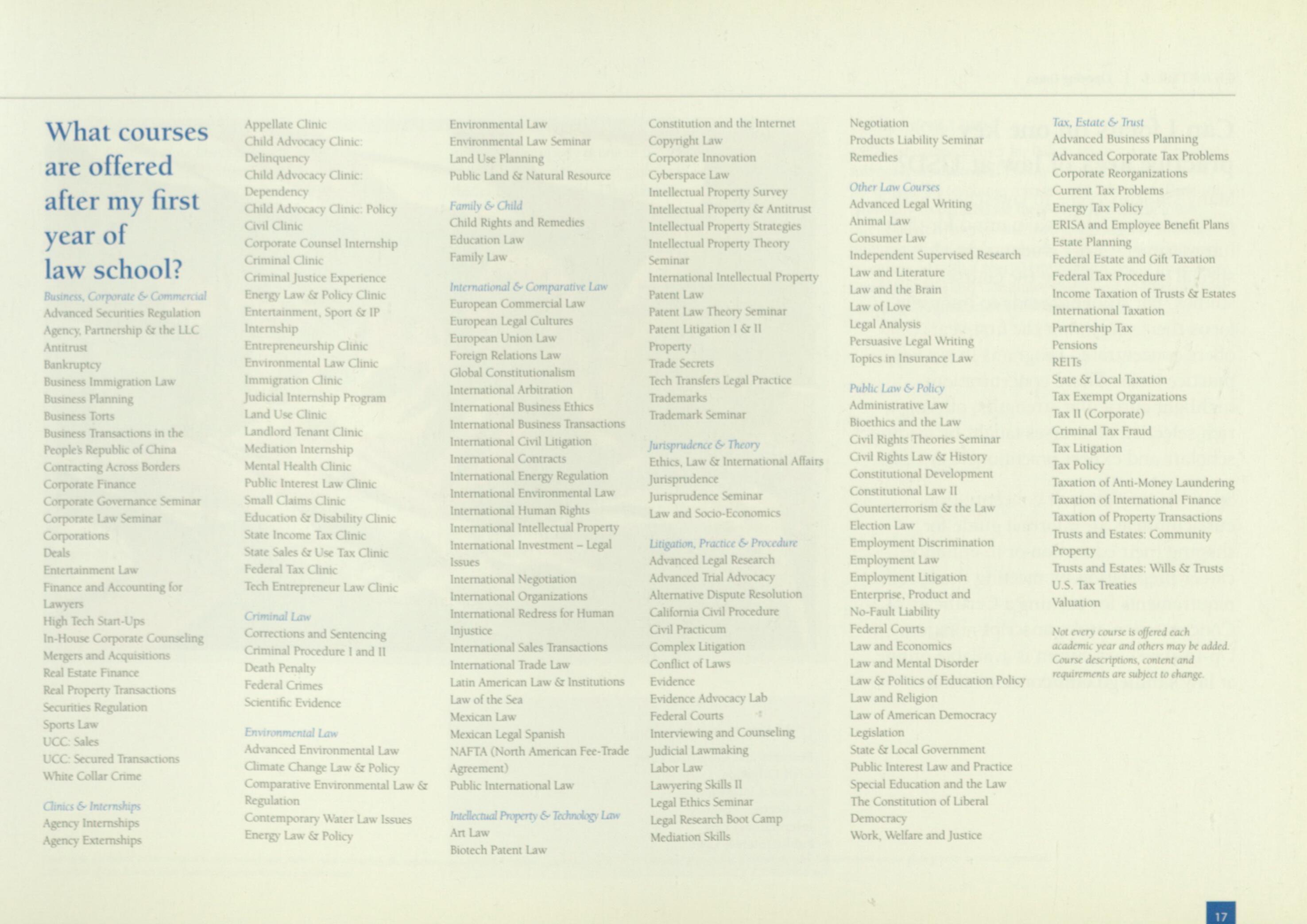
Public Law & Policy
Administrative Law
Bioethics and the Law
Civil Rights Theories Seminar
Civil Rights Law & History
Constitutional Development
Constitutional Law II
Countertenorism & the Law
Election Law
Employment Discrimination
Employment Law
Employment Litigation
Enterprise. Product and
No-Fault Liability
Federal Courts
Law and Economics
Law and Mental Disorder
Law & Politics of Education Policy
Law and Religion
Law of American Democracy-
Legislation
State & Local Government
Public Interest Law and Practice
Special Education and the Law
The Constitution of Liberal
Democracy
Work. Welfare and Justice
Tax, Estate & Trust
Advanced Business Planning
Advanced Corporate Tax Problems
Corporate Reorganizations
Current Tax Problems
Energy Tax Policy
ERISA and Employee Benefit Plans
Estate Planning
Federal Estate and Gift Taxation
Federal Tax Procedure
Income Taxation of Trusts &r Estates
International Taxation
Partnership Tax
Pensions
REITs
State &r Local Taxation
Tax Exempt Organizations
Tax II (Corporate)
Criminal Tax Fraud
Tax Litigation
Tax Policy
Taxation of Anti-Money Laundering
Taxation of International Finance
Taxation of Property Transactions
Trusts and Estates: Community Property
Trusts and Estates: Wills & Trusts
U.S. Tax Treaties
Valuation
Not every course is offered each academic year and others may be added. Course descriptions, content and requirements are subject to ehange.
What courses are offered after my first year of law school?
Can I focus on one key practice area of law at USD?
Many students come to law school with a particular practice area in mind for their future career. Other students develop a special interest during the course of their studies. For students ready to intensely focus their study after the first year, USD offers concentrated programs in six key practice areas. These concentrations highlight curricular strengths, offering a rich selection of courses taught by leading scholars and expert practitioners at USD.
Students may consult concentration curriculum as an informal guide for shaping their education or to enhance career preparation by meeting the specific requirements for earning a Certificate of Concentration and transcript notation.
Up-to-date curriculum is available online at law.sandiego.edu/concentrations.
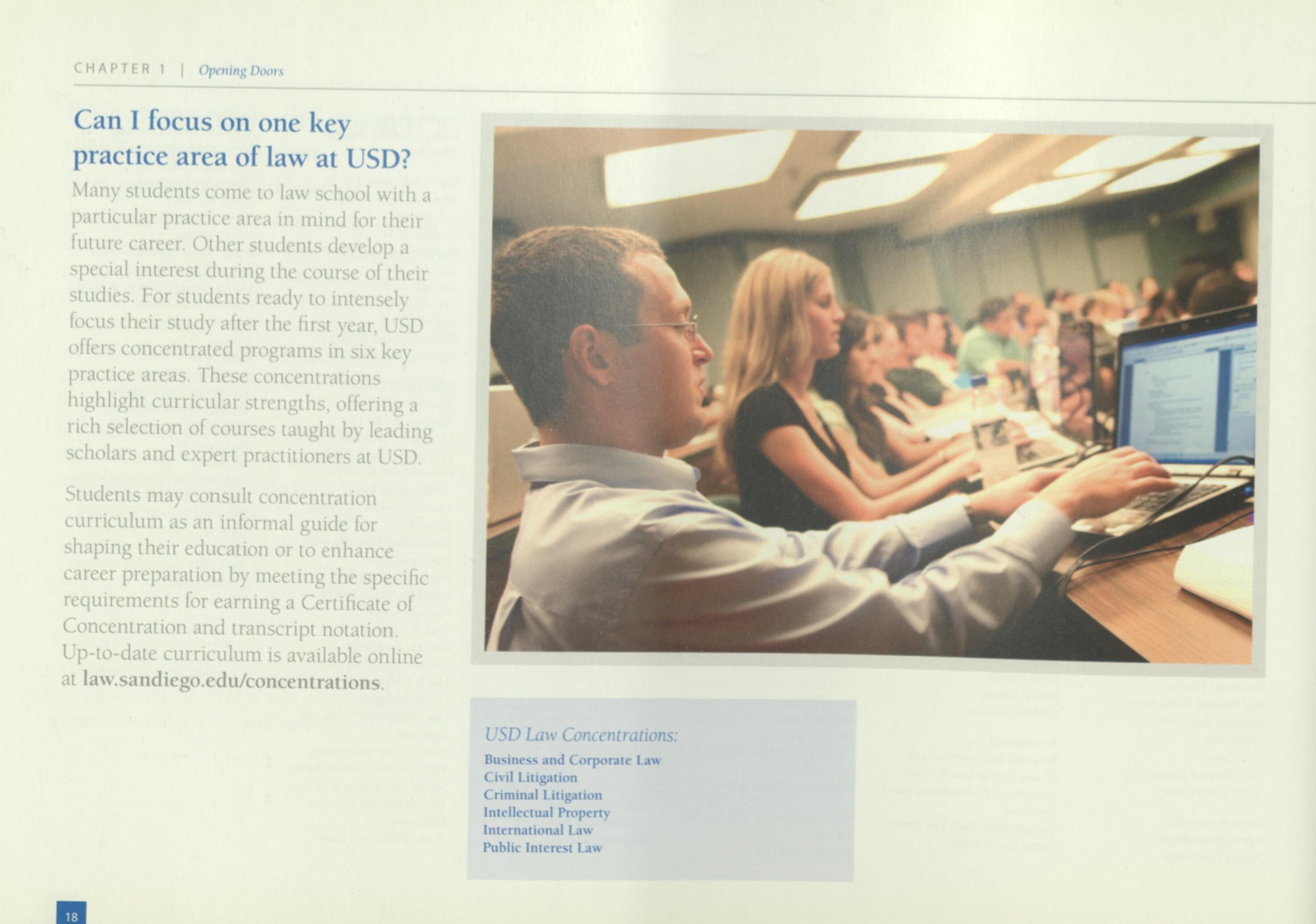
USD Law Concentrations:
Business and Corporate Law
Civil Litigation
Criminal Litigation
Intellectual Property
International Law
Public Interest Law
CHAPTER 1 | Opening Doors
19
Business and Corporate Law
Business and corporate lawyers practice in a fastpaced and changing international marketplace. Success rests on the ability to combine innovation and adaptation with a foundational understanding of the complexities of corporate structure, business finance and the regulatory environment.
Civil Litigation
Success as a civil litigator requires an education combining relevant courses and practical skills training. This concentration offers students wide latitude in charting their preparation for litigation work. Outstanding classroom offerings are paired with simulation and skills courses, including USD's nationally recognized clinical program.
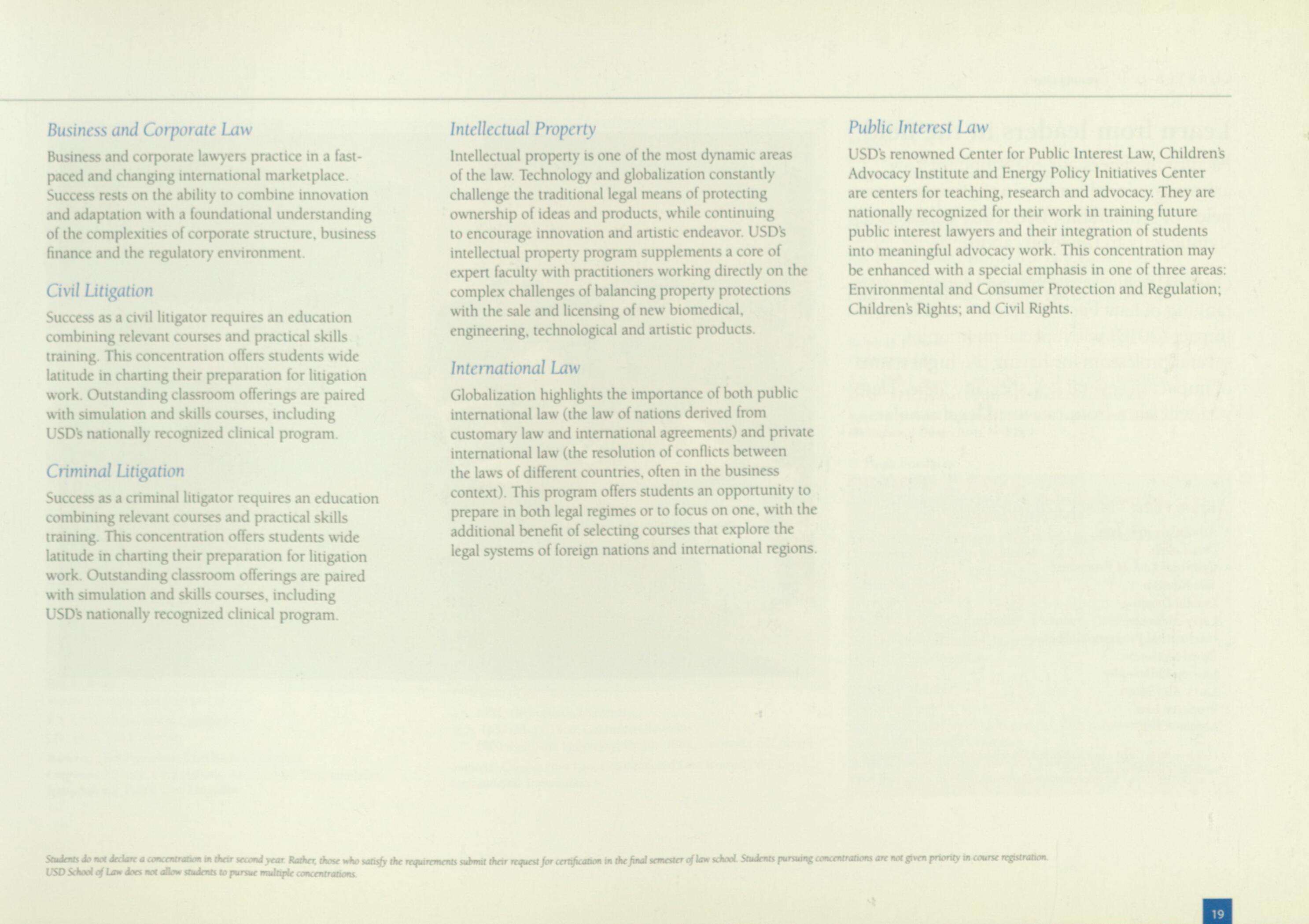
Criminal Litigation
Success as a criminal litigator requires an education combining relevant courses and practical skills training. This concentration offers students wide latitude in charting their preparation for litigation work. Outstanding classroom offerings are paired with simulation and skills courses, including USD's nationally recognized clinical program.
Intellectual Property
Intellectual property is one of the most dynamic areas of the law. Technology and globalization constantly challenge the traditional legal means of protecting ownership of ideas and products, while continuing to encourage innovation and artistic endeavor. USD's intellectual propeny program supplements a core of expert faculty with practitioners working directly on the complex challenges of balancing property protections with the sale and licensing of new biomedical, engineering, technological and artistic products.
International Law
Globalization highlights the importance of both public international law (the law of nations derived from customary law and international agreements) and private international law (the resolution of conflicts between the laws of different countries, often in the business context). This program offers students an opportunity to prepare in both legal regimes or to focus on one, with the additional benefit of selecting courses that explore the legal systems of foreign nations and international regions.
Public Interest Law
USD's renowned Center for Public Interest Law, Children's Advocacy Institute and Energy Policy Initiatives Center are centers for teaching, research and advocacy. They are nationally recognized for their work in training future public interest lawyers and their integration of students into meaningful advocacy work. This concentration may be enhanced with a special emphasis in one of three areas: Environmental and Consumer Protection and Regulation; Children's Rights; and Civil Rights.
Saintsi rue Jeekre a concentration in their tetctmd year Rather, those who satisfy the requirements suinrnt tfieir request for certification •" Atonal semester of low sdiool Saints pursuing concentrations arc not green priority in course registration. USD School cf Law docs net allow students to pursue multiple concentrations.
Learn from leaders in the field. Faculty members at USD School of Law are international leaders in their respective fields of scholarship, frequently contributing significantly to the legal canon.

Our law facility is recognized in Brian Leiters ranking of Law Faculties Based on Scholarly Impact (2010) with special mention of several professors for having the highest area of impact in several key specialty areas. Flere, you will learn from esteemed legal scholars.
Brian Letter's Most Cited Law Professors
Administrative Law
Orly Lobe/
Criminal Law & Procedure
Yah Kamisar
Donald Dripps
Larry Alexander
Intellectual Propcrty/Cyberlaw
David McGowan
Law & Philosophy
Larry Alexander
Property Law
Abraham Bell
Data from Brian teller's Law Faculties Based on Scholarly Impact, 2010. Rankings available at www.lciterranhings.com.
CHAPTER 1 | Opening Doors
m
Lawrence A. Alexander
Warrm Distinguished Professor of Law
B.A. 1965, Williams College; LL.B. 1968. Yale University
Subjects: Constitutional Law, Criminal Law, Jurisprudence, Legal Philosophy. Property
Carl A. Auerbach
Distinguished Professor of Law
A.B. 1935. Long Island University: LLB 1938. Harvard University
Subjects: Administrative Law, American Legal History, Constitutional Law, European Union Law, Law of American Democracy, Legal Profession
Jordan M. BarryAssistant Professor of Law
J.D. 2005, Stanford University: B.A. 2002. Cornell University
Subjects: Contracts. Law & Economics, Tax Policy
Abraham Bell
Professor of Law
S.J.D. 2004. Harvard University:J.D. 1993, University of Chicago. B.A. 1989. University of Chicago
Subjects: Property. Copy right
Laura S. Be rend Professor of Law
B.A. 1972, University of California, San Diego; J.D. 1975, University of San Diego
Subjects: Criminal Law, Ethics in Criminal Practice, Lawyering Skills II. Legal Clinic (Criminal), Perspectives in Criminal Justice, Trial Evidence & Advocacy
Roy L. Brooks
Warrm Distinguished Professor of Law
B.A. 1972, University of Connecticut; J.D. 1975, Yale University
Subjects: Civil Procedure, Civil Rights Litigation, Corporate Finance, Corporations. Employment Discrimination, Jurisprudence. Public Law Litigation
Karen C. Burke
Warrm Distinguished Professor of Law
B.A. 1972, Smith College; M.A. 1975, Ph.D. 1979, Harvard University; J.D. 1982, Stanford University; LL.M. 1985, Boston University
Subjects: Pensions. Federal Taxation
Nancy Carol Carter
Professor of Law
B.S. 1963, M.S. 1969, Texas A & IUniversity, M.L.S. 1967, J.D. 1975, University of Oklahoma
Subjects: Legal Research & Writing, Native American Law
Laurence P. Claus
Professor of Law
B Econ. 1987, LL.B. 1991, University of Queensland; D.Phil. 1998, University of Oxford
Subjects: Comparative Constitutional Law, Constitutional Law, Contracts, International Law
Kevin Cole Dean and Professor of Law
B.A. 1979. New College; J.D. 1983. University of Pennsylvania
Subjects: Criminal Justice System,Criminal Law, Criminal Procedure, Evidence, Legal Profession
Lynne L. Dallas Professor of Law
B.A. 1972, University of Rochester, J.D. 1975, Harvard University
Subjects: Antitrust, Comparative Corporate Law, Corporate Finance. Corporate Law, Corporations, Law & Socioeconomics. Securities Regulation
Joseph J. Darby Professor of Law Emeritus
B.S. 1952, Georgetown University;
M.A. 1957, Ph.D. 1966, Columbia University;
J.D. 1960, Fordham University; Dr. Jur. 1965, University of Cologne
Subjects: Comparative Law, Constitutional Law, International Law, International Transactions

Donald A. Dripps
Professor of Law
B.A. 1980, Northwestern University; J.D. 1983, University of Michigan
Subjects: Administrative Law, Criminal Law, Criminal Procedure, Evidence
Robert C. Fcllmeth Price
Chair in Public Interest Law
A.B. 1967, Stanford University; J.D. 1970, Harvard University
Subjects: Antitrust Law, California Administrative Law & Practice, Child Rights & Remedies, Consumer Law, Criminal Procedure, Public Interest Law
Ralph H. Folsom Professor of Law
A.B. 1968. Princeton University; J.D. 1972, Yale University;
LL.M. 1973, London University (School of Economics)
Subjects: Antitrust, European Union Law, International Trade, International Transactions, NAFTA
C. Hugh Friedman Professor of law
A.B. 1953, Yale University; J.D. 1956, Stanford University; LL.D. (Hon.) 1976, University of San Diego
Subjects: Accounting, Agency & Partnership, Business Planning, Corporations, Securities Regulation
Steven Hartwell Professor of Law
B.S. 1960, J.D. 1964, University of Southern California
Subjects: Clinical Teaching, Legal Profession, Negotiations, Office Practice, Street Law
Walter W. Hciser Professor of Law
B.A. 1968, University of Michigan; J.D. 1971, University of Wisconsin;
LL.M. 1978, Harvard University
Subjects: Advanced Trial Advocacy, California Civil Procedure, Civil Procedure, Federal Jurisdiction, International Civil Litigation
CHAPTER 1 | Opening Doors
Gail Heriot
Professor of Law
B.A. 1978, Northwestern University; J.D. 1981, University of Chicago
Subjects: Employment Law, Evidence, Remedies, Torts
Paul Horton
Professor of Law
A.B. 1965, Occidental College;
J.D. 1968, University of Southern California; LL.M. 1969, Yale University
Subjects: Adjudication, Communications, Family Law, Judicial Internship, Patents, Copyrights & Trademarks
Yale Kamisar
Distinguished Professor of Law
A.B. 1950, New York University;
LL.B. 1954, Columbia University
Subjects: Constitutional Law, Criminal Law, Criminal Procedure, Evidence
Michael B. Kelly
Professor of Law
B.G.S. 1975, J.D. 1983, University of Michigan; M.A. 1980, University of Illinois at Chicago
Subjects: Contracts, Family Law, Insurance, Remedies
William H. Lawrence Professor of Law
B.A. 1966, J.D. 1972, University of Oregon
Subjects: Commercial Law (Sales and Secured Transactions), Commercial Paper, Contracts, International Business Transactions
Herbert
I. Lazerow
Professor of Law
A.B. 1960, University of Pennsylvania; J.D. 1963, Harvard University;
LL.M. 1964, George Washington University; D.E.S.S. 1982, University of Paris 1
Subjects: Federal Estate &Gift Taxation, International Taxation, International Transactions, Property, Public International Law, Federal Taxation
Orly Lobel Professor of Law
LL.B. 1998, Tel Aviv University;
LL.M. 2000, Harvard Law School;
S.J.D. 2006, Harvard Law School
Subjects: Administrative Law, Consumer Law, Employment Law, Legal Theory, Torts
Shaun P. Martin Professor of Law
A.B. 1988, Dartmouth College;
J.D. 1991, Harvard University
Subjects: Civil Procedure, Criminal Procedure, Federal Courts, Legal Profession, Professional Responsibility
Lesley K.
McAllister
Professor of Law
B.S.E. 1991, Princeton University;
J.D. 2000, Stanford University;
Ph.D. 2004, University of California, Berkeley
Subjects: Environmental Law and Policy, Property Law, Comparative Environmental Law
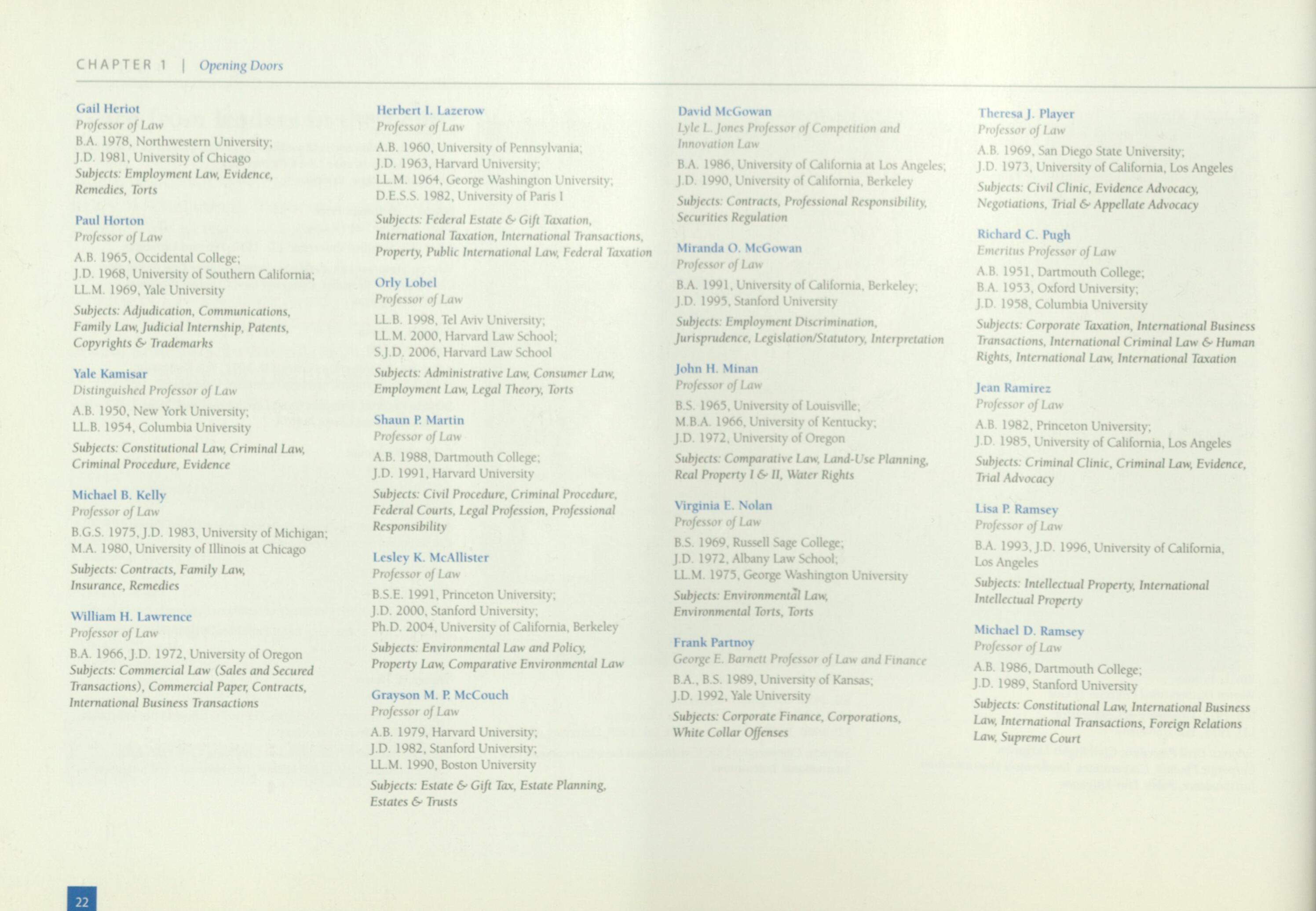
Grayson M. P.McCouch Professor of Law
A.B. 1979, Harvard University;
J.D. 1982, Stanford University;
LL.M. 1990, Boston University
Subjects: Estate & Gift Tax, Estate Planning, Estates & Trusts
David McGowan
Lyle L. Jones Professor of Competition and Innovation Law
B.A. 1986, University of California at Los Angeles;
J.D. 1990, University of California, Berkeley
Subjects: Contracts, Professional Responsibility, Securities Regulation
Miranda O. McGowan Professor of Law
B.A. 1991, University of California, Berkeley; J.D. 1995, Stanford University
Subjects: Employment Discrimination, Jurisprudence, Legislation/Statutory, Interpretation
John H. Minan Professor of Law
B.S. 1965, University of Louisville, M.B.A. 1966, University of Kentucky;
J.D. 1972, University of Oregon
Subjects: Comparative Law, Land-Use Planning, Real Property I & II, Water Rights
Virginia E. Nolan Professor of Law
B.S. 1969, Russell Sage College;
J.D. 1972, Albany Law School;
LL.M. 1975, George Washington University
Subjects: Environmental Law, Environmental Torts, Torts
Frank Partnoy
George E. Bamett Professor of Law and Finance
B.A., B.S. 1989, University of Kansas; J.D. 1992, Yale University
Subjects: Corporate Finance, Corporations, White Collar Offenses
Theresa J. Player Professor of Law
A.B 1969, San Diego State University; J.D. 1973, University of California, Los Angeles
Subjects: Civil Clinic, Evidence Advocacy, Negotiations, Trial & Appellate Advocacy
Richard C. Pugh Emeritus Professor of Law
A.B. 1951, Dartmouth College; B.A. 1953. Oxford University; J.D. 1958, Columbia University
Subjects: Corporate Taxation, International Business Transactions, International Criminal Law & Human Rights, International Law, International Taxation
Jean Ramirez Professor of Law
A.B. 1982, Princeton University; J.D. 1985, University of California, Los Angeles
Subjects: Criminal Clinic,Criminal Law, Evidence, Trial Advocacy
Lisa P Ramsey Professor of Law
B.A. 1993, J.D. 1996, University of California, Los Angeles
Subjects: Intellectual Property, International Intellectual Property
Michael D. Ramsey Professor of Law
A.B. 1986, Dartmouth College; J.D. 1989, Stanford University
Subjects: Constitutional Law, International Business Law, International Transactions, Foreign Relations Law, Supreme Court
Q
Michael
B. Rappaport Professor of
Law
B A 1981, Stale University of New York. Binghamton;
J.D. 1985, D.CL 1990. Yale University
Subjects: Administrative Law. Environmental Law. Insurance. Legal History. Legislation
Maimon Schwarzschild Professor of Law
B.A. 1973, J.D. 1976, Columbia University
Subjects: Civil Procedure. Constitutional Law. Criminal Procedure. European Community Law, Evidence. International Law
Virginia V. Shue Professor of Law
B.A. 1964, Stanford University;
J.D. 1972, University of San Diego
Subjects: Property, Income Taxation. Trusts & Estates
Ted Sichelman
Assistant Professor of Law
J.D 1999. Harvard University; M.S. 1996, Florida State University; A.B 1992, Stanford University
Subjects: Patent Law, Intellectual Property Theory Seminar
Steven D. Smith
Warnrn Distinguished Professor of Law
B.A. 1976, Bngham Young University;
J.D. 1979, Yale University
Subjects: Constitutional Law, Law & Religion, Jurisprudence, Torts
Thomas A. Smith Professor of Law
A.B. 1979, Cornell University;
B.A. 1981, Oxford University;
J.D. 1984, Yale University
Subjects: Administrative Law. Contracts. Corporate Finance, Corporate Law, Financial Institutions
Allen C. Snyder Professor of Law
B.A. 1968, Washington and Jefferson College;
J.D. 1974, Northwestern University
Subjects: Civil Clinic, International Negotiations. Interxiewing & Counseling, Law & Medicine, Law & Psychiatry, Negotiations
Lester B. Snyder Emeritus Professor of Law
B.S. 1951, Syracuse University;
J.D. 1956, Boston University;
LL.M. 1961. Columbia University
Subjects: Business Planning, Estate Planning, State & Local Taxation, Tax Accounting, Federal Taxation, Tax Policy
Edmund Ursin Professor of Law
A.B. 1964, J.D. 1967, Stanford University
Subjects: Jurisprudence, Legal Process, Products Liability, Tort Theory, Torts
Jorge A. Vargas Professor of Law
J.D. 1964, National Autonomous University of Mexico (UNAM);
LL.M. 1970, Yale University
Subjects: Comparative Law, Immigration Law, International Environmental Law, International Human Rights, International Law, International Organizations
Richard J. Wharton Clinical Professor
B.A. 1966, University of Dayton;
J.D. 1973, University of San Diego
Subjects: Civil Legal Practice, Environmental Law Clinic, Environmental Law, Lawyering Skills II, Legal Practicum
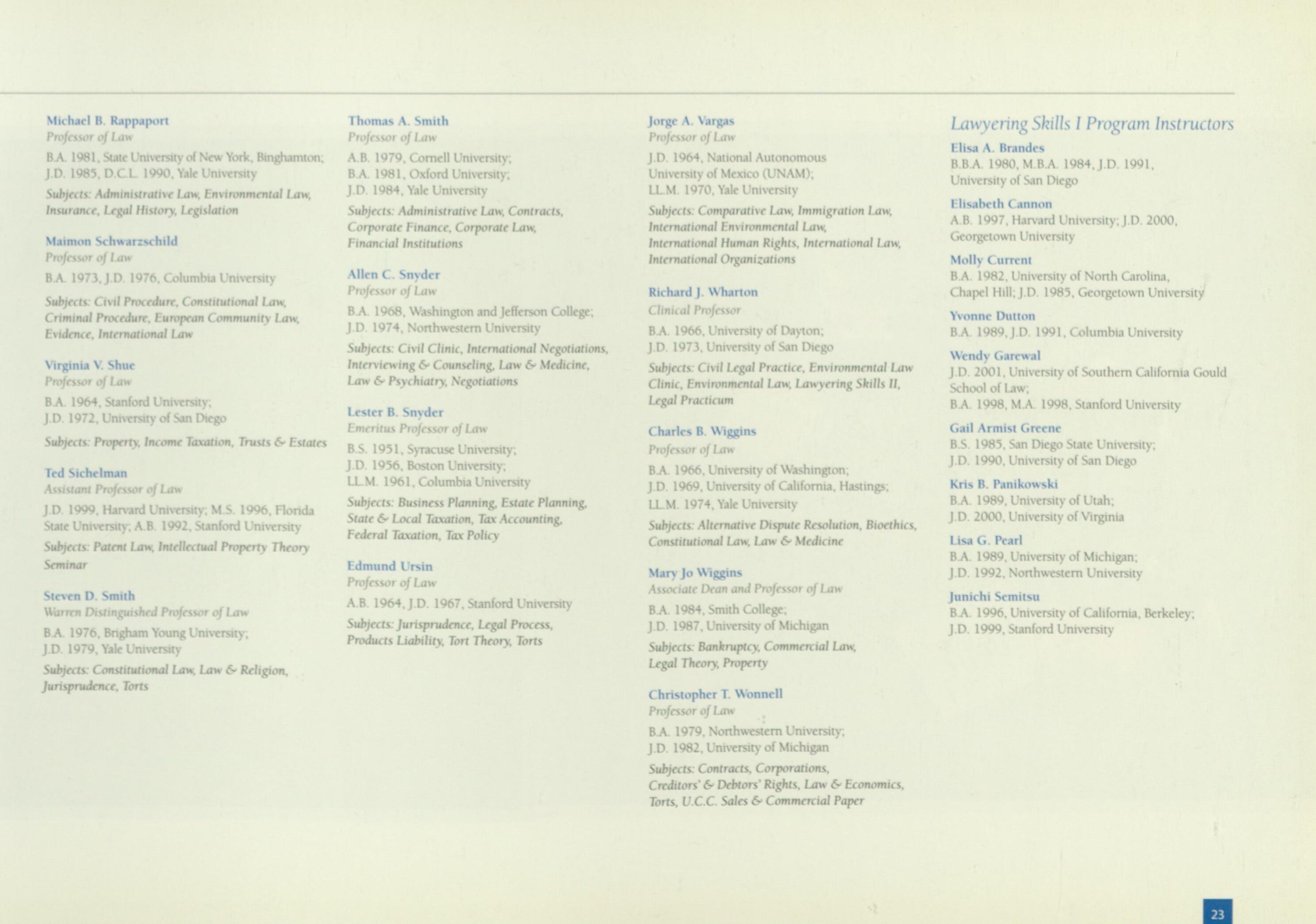
Charles B. Wiggins Professor of Law
B.A. 1966, University of Washington;
J.D. 1969, University of California, Hastings;
LL.M. 1974, Yale University
Subjects: Alternative Dispute Resolution, Bioethics, Constitutional Law, Law & Medicine
Mary Jo Wiggins
a cc/vi/if/* FV/iti anA Pm/Aoir nf I /iu
Lawyering Skills I Program Instructors
Elisa A. Brandes
B.B.A. 1980, M B.A. 1984, J.D. 1991, University of San Diego
Elisabeth Cannon
A.B. 1997, Harvard University; J.D. 2000, Georgetown University
Molly Current
B.A. 1982, University of North Carolina, Chapel Hill; J.D. 1985, Georgetown University
Yvonne Dutton
B.A. 1989, J.D 1991, Columbia University
Wendy Garewal
J.D. 2001, University of Southern California Gould School of Law;
B.A. 1998, M.A. 1998, Stanford University
Gail Armist Greene
B.S. 1985, San Diego State University; J.D. 1990, University of San Diego
Kris B. Panikowski
B.A. 1989, University of Utah; J.D. 2000, University of Virginia
Lisa G. Pearl
B.A. 1989, University of Michigan, J.D. 1992, Northwestern University
Junichi Semitsu
B.A. 1984. Smith College; g ^ 1996. University of California, Berkeley; J.D. 1987, University of Michigan j D 1999 Stanford University
Subjects. Bankruptcy, Commercial Law, Legal Theory, Property
Christopher T. Wonnell Professor of Law
B.A. 1979, Northwestern University; J.D. 1982, University of Michigan
Subjects: Contracts,Corporations, Creditors' & Debtors' Rights, Law &>Economics, Torts, U.C.C.Sales & Commercial Paper
CHAPTER 2 Dig in Deeper
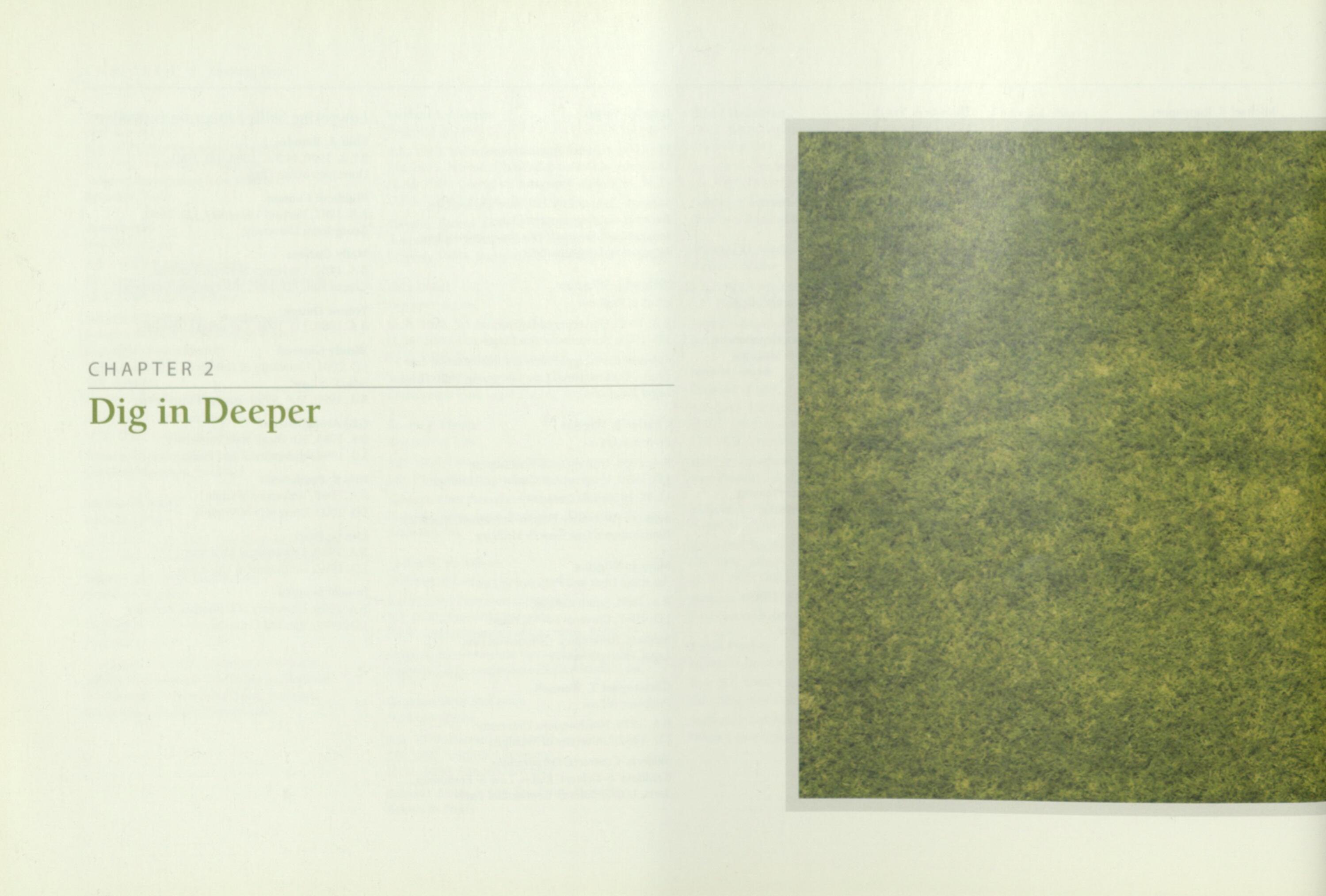

Hands-on legal experience
Learn first-hand from highly skilled attorneys and interact directly with actual clients. Here, you can gain valuable legal practice experience at USD School of Laws renowned legal clinics as well as public and private internship programs before you graduate from law school.
USD School of Law is ranked 23rd nationally among ABA-approved law schools for "most clinical opportunities available."
The National Jurist
September 2008
USD Legal Clinics were honored with the Bernard E. Witkin Award for Civic Leadership and Excellence in Teaching of the Law.
Law Library Justice Foundation
March 2009
Administrative Hearing
Train as a hearing officer and be appointed to hear and decide administrative cases for various municipal agencies.
Agency Internship Program
Earn academic credit for class sessions and employment with a civil law employer—either a government agency or a nonprofit organization.
Appellate Clinic
Brief and argue an appeal in the United States Ninth Circuit Court of Appeals. This year-long clinic immerses students into the appellate litigation process from start to finish. Students prepare an opening brief in the fall and a reply brief in the spring and have the opportunity to participate in oral arguments. The weekly required class is a one-hour seminar on the appellate process including writing, oral advocacy, persuasion and relevant law.
Child Advocacy
Promote the health and well-being of children with three clinical options: (I) assist in the representation of abused and neglected minors in dependency court proceedings;
(2) assist in the representation of minors charged with offenses in delinquency court proceedings; or (J) work with staff of the Children's Advocacy Institute on policy advocacy projects such as impact litigation, legislative and regulatory advocacy, public education programs and in-depth research projects.
Civil
Receive intensive personal training in client relations, legal prohlem-solving, case management, and preparation and presentation of cases in court. Interview, counsel and represent clients in actual civil cases ranging from consumer issues todebt collection to uninsured motorist claims.
Corporate Counsel Internship Program
1he Corporate Counsel Internship Program consists of both work and classroom components and allows students the opportunity to earn between one and three academic credit for working in a corporation's office of general counsel.
Criminal
Work for a prosecuting or defending trial agency in the criminal justice system while meeting weekly for training classes with professor/attorneys. Weekly meetings include simulations, lectures and discussions in the most common areas of criminal practice.
Criminal Justice Experience
Work alongside the Deputy Public Defender in the Felony Arraignment Department of Superior Court to prepare a defendant charged with felony offenses for arraignment and initial bail hearing. Counsel and advise homeless who have criminal issues at a community non-profit organization.
Energy Law and Policy Clinic
Work with energy-related state agencies, their staff and commissioners to research topical issues related to policy and regulation development in California. Recent project ha\ e included researching legal issue related to California's Cap and Trade Program (California Air Resources Board) and the role of transmission in developing renewable energy resources (California Public Utilities Commission).
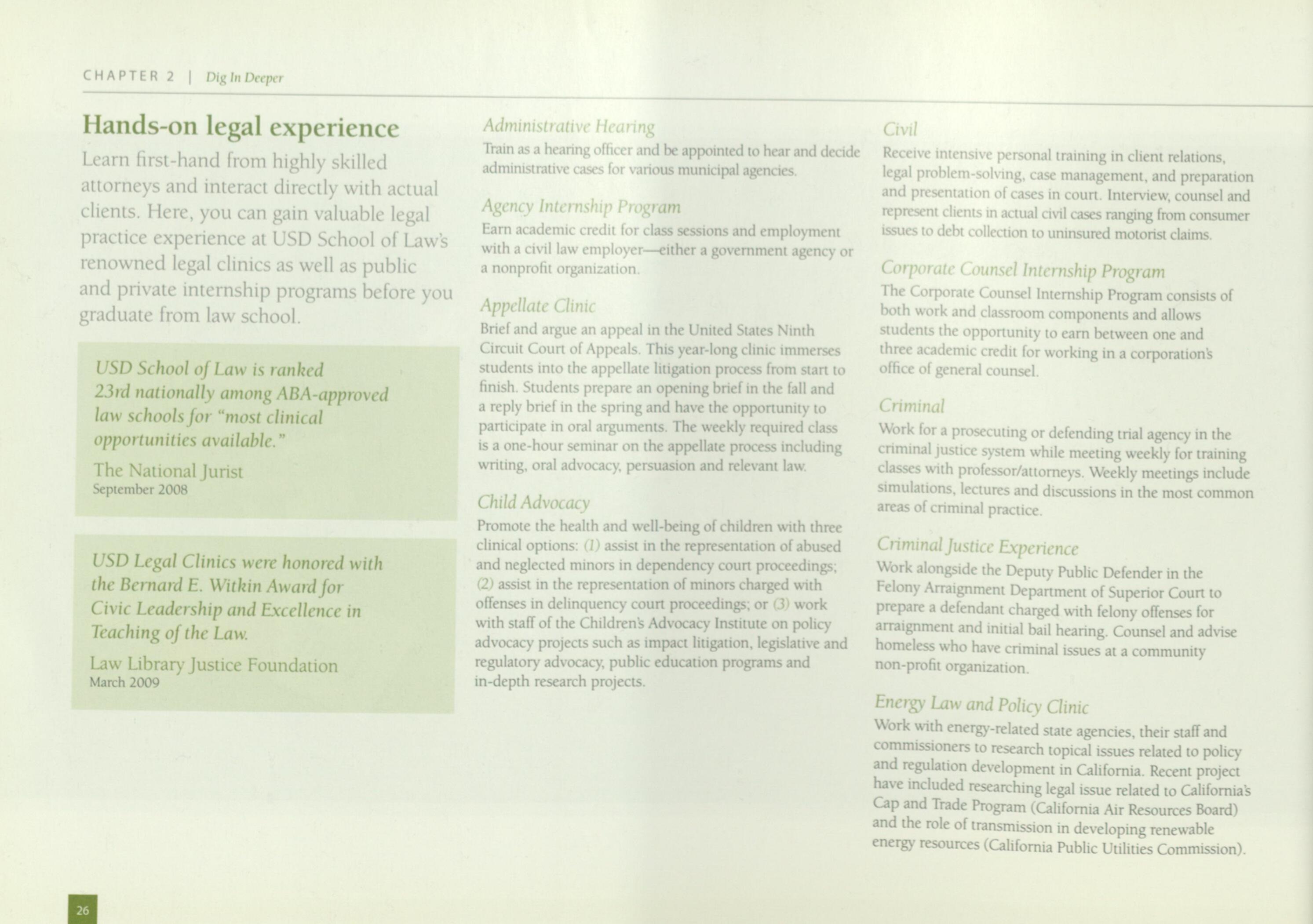
CHAPTER 2 | Dig In Deeper
Entertainment, Sports and Intellectual Property (ESIP) Internship Program
The Entertainment, Sports and Intellectual Property Internship Program consists of both work and classroom components and allows students toearn between one and three academic credits for working in a law department of an entertainment or sports industry company, talent guild or trade association, or in the intellectual property law department of a company or trade association.
Entrcpreneurship
Provide pro bono legal services to low- and moderateincome entrepreneurs who want to start or expand their small businesses. Legal matters include determining appropriate choice of business entity, obtaining necessary permits and licenses, employment and independent contractor issues, commercial contracts and leases, and the establishment of tax-exempt organizations.
Environmental
Develop environmental law litigation skillsfocusing on high-impact environmental cases, often assistingcommunity environmental organizations with issues regardingair and water pollution, waste facilities, the federal Environmental Protection Agency and environmental impact reports.
Immigration
Interview, counsel and represent clients with immigrationrelated problems such as asylum, immigrating family members, naturalization and deportation. Train in the practical application of immigration law and casework as well as actively participate at Immigration Court hearings.
Judicial Internships
Fully develop legal research skills and eam academic credit for w orking with judges at state or federal trial or appellate courts.
Landlord Tenant

Receive intensive training in litigation techniques, problem solving and case management. Draft pleadings, conduct discovery, and confer and negotiate with opposing parties. Interview, counsel and represent clients in Superior Court unlawful detainer trials. Unlawful detainer actions include evictions of tenants following bank foreclosures of landlord property, issues of habitability, retaliatory eviction, lease and contract interpretation, the Fair Debt Collection Practices Act and the Anti-SLAPP special motion.
Land Use
Leam the basic statutory and regulatory framework of land-use law by reviewing environmental documents, attending community meetings and delving into affordable housing issues through a job placement with government or non-profit agencies, elected officials or attorneys in private practice. Most placements are within the City of San Diego, including in the City Attorneys office. Mayor's office and City Council offices.
Public Interest Law
Research and advocate for a public cause. Third- and fourth-year students who have completed the Public Interest Law and Practice course may choose an individual research or advocacy project for completion in one or two semesters.
Small Claims
Develop interviewing, counseling and trial preparation skills in the Small Claims Court context (civil disputes less than 57,500). Prepare client cases for trial at Small Claims Court, including reviewing files, identifying legal issues, planning legal arguments and identifying evidence and witnesses. Work closely to assist clients to ably represent themselves.
Special Education
Represent parents of children with special needs pursuant to the federal Individuals with Disabilities Education Act. Receive practical training and experience with client intake, interviewing, counseling, and client representation at extensive meetings with school district personnel and district counsel. Some cases proceed to formal mediation and due process administrative hearings, where students argue the case with support from the supervising attorney.
State Tax (California)
Assist taxpayers in one of two state tax clinics: income tax or sales and use tax. Work includes appeals and other proceedings before the State of California's Franchise Tax Board. Receive legal practice skills training including interviewing clients, identifying evidence,drafting legal briefs and appeals, participating in negotiations, and appearing at administrative hearings. This is a joint effort with the California State Board of Equalization.
Tax Clinic (Federal)
Develop tax controversy abatement skills by working to resolve tax disputes with the Internal Revenue Service in matters such as collection actions or audits, earned income tax credits and offers in compromise. Learn client interviewing skills, appropriate IRS personnel interaction, and how to effectively resolve a client's federal lax dispute.
Technology Entrepreneurship Clinic (TEC) .
The new Technology Entrepreneurship Clinic (TEC) provides USD law students hands-on, real world experience assisting new businesses. Students work side-by-side with respected practicing attorneys from IP law firms throughout the region to help start-ups with corporate, intellectual property and employment legal needs.
Centers and Institutes
The scholastic centers and institutes at USD School of Law provide you with the opportunity to work closely with leading legal scholars in various fields. Here, one-on-one, you can learn from and work with the brightest legal minds.
Center for Corporate and Securities Law

The Center for Corporate and Securities Law helps enrich scholarly and popular debate on a wide range of issues related to corporate governance, financial regulation and other business law topics. The center hosts academic and public conferences, publishes papers and discussions from those conferences, provides point-of-contact for popular and business media on issues of broad public interest, supports faculty and student research, and sponsors public lectures.
Center for Education Policy and Law (CEPAL)
CEPAL is a joint undertaking of the USD School of Law and the School of Leadership and Education Sciences.
Established by a grant from the William D. Lynch Foundation in 2007, the center's mission is to foster better communication and cooperation between educational research, policymaking and practice.
Center for Intellectual Property Law and Markets
The Center for Intellectual Property Law and Markets trains studentsin the fundamentals of intellectual property laws and in the ways clients use intellectual property (IP) rights to compete in real-world markets. USD's focus on the role of IP rights in markets distinguishes it from other, more traditional IP centers. It also provides a forum where lawyers, clients, judges and policymakers canshare ideas about IP doctrines and policies. The center's policy workshops also provide opportunities for studentsand community members to engage discussion about current IP policy issues, focusing on the intersection between economic analysis and IP policy.
CHAPTER 2 | Dig In Deeper
Center/or Public Interest Law (CP1L)
Founded in 1980. CPIL is an academic center of research and advocacy in regulatory and public interest law. CPIL focuses its efforts on the study of an extremely powerful, yet often overlooked, level of government: state regulatory agencies. Under the supervision of experienced public interest attorneys and advocates, CPIL law student interns study California agencies that regulate business, professions and trades.
Center for the Study of Constitutional Originalism
On August 30, 2006, U.S. Supreme Court Justice Antonin Scalia gave a lecture marking the inauguration of the Center for the Study of Constitutional Originalism. The center's mission is toeducate the legal academy, the bar and the bench, law students and the public regarding the meaning of various constitutional provisions and to evaluate the methodologies appropriate to ascertain their meaning.
Children's Advocacy Institute (CAI)
CA1 was founded in 1989 as part of the Center for Public Interest Law. Staffed by experienced attorneys and advocates, advised by the CAI Council for Children, and assisted by USD law student interns, CAI works to improve the statusand well-being of children in our society by representing their interests and right to a safe, healthy childhood. In addition to its academic program, which trains law students to be effective child advocates, CAI represents the interests of children and youth in legislatures, in courts, before administrative agencies and through public education programs.
COMPASS Family Center
A joint undertaking of USD Legal Clinics, School of Leadership and Education Sciences and USD Counseling Center, COMPASS helps families cope more effectively with the challenges and needs presented by having a child with a disability or chronic illness. Offered by upper division law students under the supervision of an attorney, education advocacy assistance at COMPASS provides legal services that range from advice and consultation to formal mediation to due process hearings. Consultations are free and can assist parents in navigating the laws and regulations regarding special education.
Energy Policy Initiatives Center (EPIC)
EPIC studies energy policy issues affecting the San Diego region and the state of California. The center integrates research and analysis, law school study and public education, and also serves as a source for legal and policy expertise and information in the development of sustainable solutions that meet our future energy needs. EPIC currently offers a law school course on energy law
and policy that provides an overview of electric and natural gas regulation and a companion clinic that matches students with a state agency to conduct research on topical energy-related issues. EPIC also conducts legal and policy research to educate decision makers about policy options and monitors legislative activity related to energy policy issues affecting the San Diego region and California.

Institute for Law and Philosophy
The Institute for Law and Philosophy was established at USD in the fall of 2000. The fundamental goal of the institute is to unite philosophical issues with jurisprudence. This is accomplished through a variety of programs designed to explore and educate regarding the various philosophical issues that arise from legal doctrines, legal institutions and legal practice. Such programs include roundtable discussions, academic conferences, public lectures and educational programs. The institute selects the leading academics, lawyers and judges who define the topic at hand, and invites them to engage in discussion that is ultimately published, discussed and/or edited.
Summer Abroad Programs

USD School of Law, in cooperation with foreign universities, sponsors the Institute on International and Comparative Law, which conducts summer law study programs overseas. The programs introduce American law students to foreign law and legal institutions, and provide intensive study during four- to five-week sessions. Classes abroad sensitize students to the cultural differences that influence effective international dealing and expose students to the perspectives of foreign experts. Among the summer 2010 offerings were: Barcelona, Florence, London and Paris. Here, you can experience international law first-hand.
Barcelona
The Barcelona program specializes in European law. It offers several courses related to the law of the EU, as well as complementary coursesin international contracts, international corporations and international environmental law. Students fluent in Spanish may participate in an international business law clinic, which offers opportunities to work in Barcelona law firms.
Law related to intellectual and artistic creativity is the theme of the Florence program. Courses in international art law and international intellectual property are generally offered. Related courses in immigration law, international negotiations, international litigation, international entertainment law and international contracts may also be offered.
CHAPTER 2 | Dig In Deeper
Florence
London
The London program focuses on international business law Comparative courses cover banking, taxation, corporations, antitrust and labor law. The program also offers the opportunity to participate in a clinical experience with either a barrister or solicitor.
Paris
The Paris program examines international and comparative law, focusing on the cultural differences that influence international dealing, and the differences and similanttes between civil law and common law jurisdictions Students may participate in an international business law clinic or work in a Paris law firm.
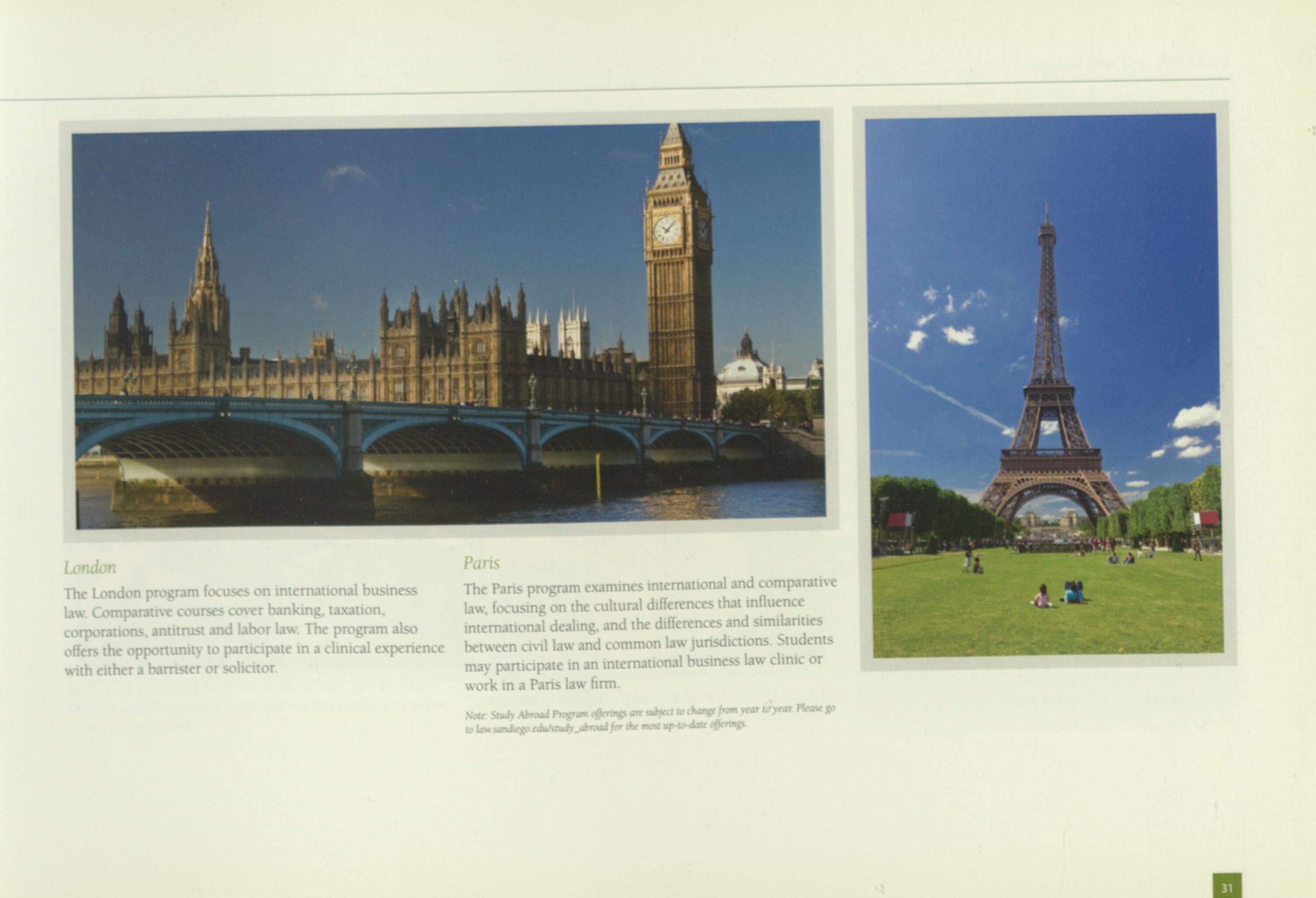
D
Note Srudv Abroad Program offerings, arc subject to change from near to year Pkase go to 1m sonchrgo edu/sluds_abroad for the most up-to-date effermgs
Moot court & mock trial competitions

A capacity crowd at a college sporting event is almost expected. But what about at a moot court competition? It's not unheard of at USD School of Law. Here, quality matters. It's what makes memorable lawyers.
"I have taught at four other law schools and I have never seen students get so fired up about moot court as they do at USD," says USD Professor of Law Yale Kamisar, known as the "Father of Miranda" and one of the nation's foremost authorities on criminal procedure.
CHAPTER 2 | Dig In Deeper
B
Moot Court
The nationally ranked Moot Court program at USD is administered by the Appellate Moot Court Board, comprised of students selected from among the outstanding competitorsin the previous year's moot court competitions. The board administers a competitive intramural program for second-, third- and fourth-year students. This competitive program allows students to improve their wntten and oral advocacy skills while competing for academic honors and membership on regional and national teams. The board also sends teams to compete in national and regional moot court competitions. In 2010, the program was ranked 16th in the nation.
Four competitions are sponsored by the Moot Court Board during the academic year:

Alumni Intramural Tournament
Intellectual Property Intramural Tournament
Criminal Procedure National Tournament
Paul A. McLennon, Sr. Moot Court Competition
USD School of Law also sends lopstudents to the annual Willem C. Vis International Commercial Arbitration Moot competitions in Europe and Asia.
Other notable annual competitions include the Chief Judge Conrad B. Duberstein National Moot Court Competition on Bankruptcy Law. the American Bar Association (ABA) Section of Taxation Law Student Tax Challenge, and the International Trademark Associations Saul Lefkowitz Moot Court Competition.
National Trial Team
Since 1987, when head coach Professor Richard J. Wharton established the program, USD's trial team has consistently ranked among the finest teams in the nation. Members of the team are selected through intra-school competitions held in September. Second-year students are selected by a closing argument competition and third-year students are selected by a trial competition. All students selected compete in at least one national competition.
The National Trial Team competes in five major tria tournaments throughout the year:
ABA National Criminal Law Competition
Association of Trial Lawyers National Trial Competition
California State Championship Tournament
National Tournament of Champions
Texas Young Lawyers National Trial Competition
"What you've seen tonight is no different than what I see in the Ninth Circuit courtroom every day," remarked the Honorable M. Margaret McKeown, United States Circuit Judge of the Ninth Circuit Court of Appeals, to the crowd of 200-plus spectators at the annual Paul A. McLennon, Sr., Moot Court Competition. "You have all been treated to the highest level of law skills."
Law reviews and journals
What do USD's law reviews and journals have to offer me? Employers look for graduates who have experience managing large projects to completion, especially ones that take small budgets to accomplish big things. Being an editor of a law review or a journal also teaches critical legal skills such as fact-checking and how to arrange information to best support arguments. Plus, the opportunity to be on the inside of developing legal scholarship provides you first-hand knowledge of emerging legal concepts. Here, we give you the resources to learn important management skills necessary to impress employers.
Journal of Climate & Energy Law QCEL)
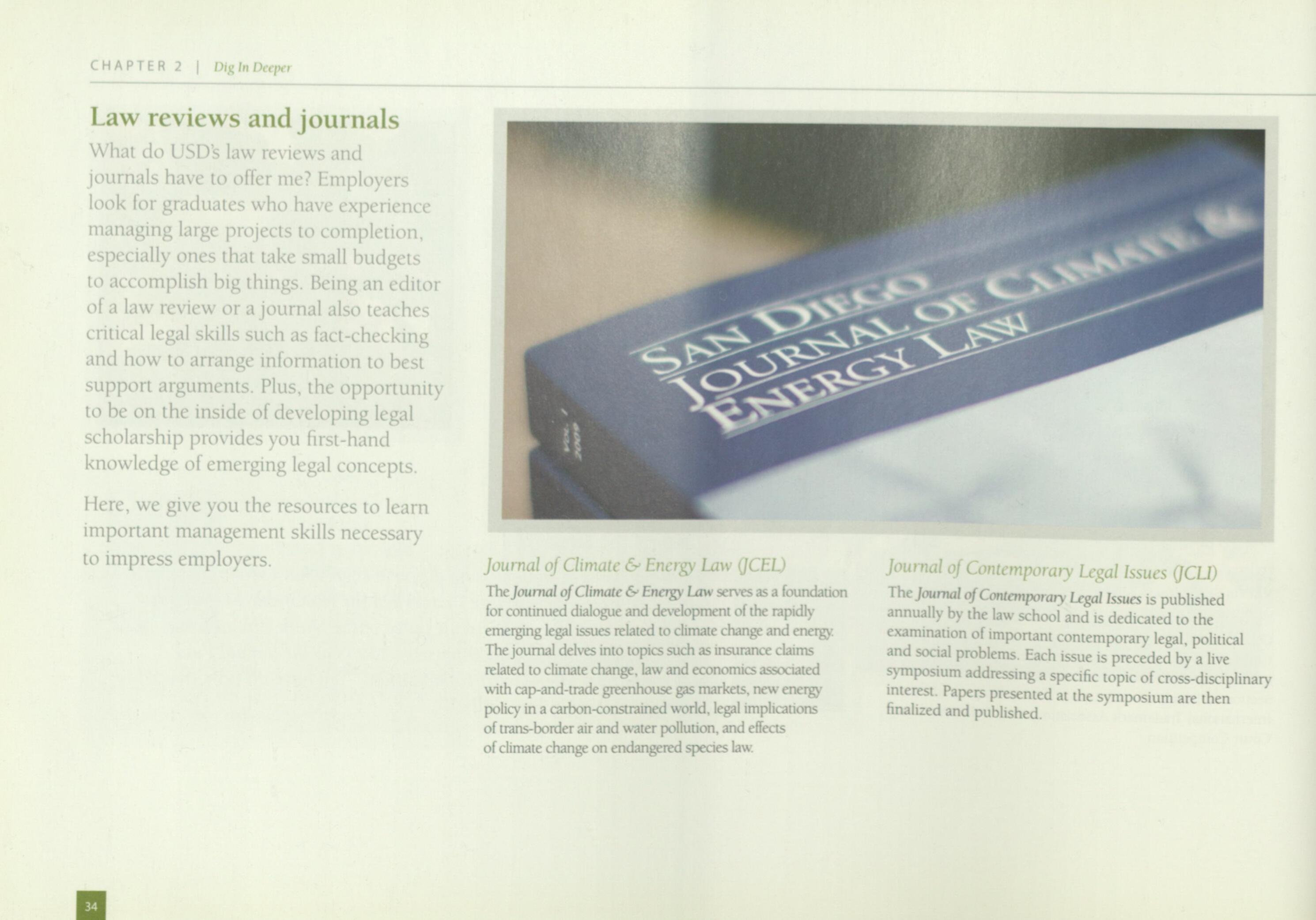
TheJournal of Climate & Energy Law servesas a foundation for continued dialogue and development of the rapidly emerging legal issues related to climatechange and energy. The journal delvesinto topics suchas insurance claims related to climate change,law and economicsassociated with cap-and-trade greenhousegas markets, newenergy policy in a carbon-constrained world,legal implications of trans-border air and water pollution,and effects of climate change onendangered species law.
Journal of Contemporary Legal Issues QCU)
1heJournal of Contemporary Legal Issues is published annually by the law school and is dedicated to the examination of important contemporary legal, political and social problems. Each issue is preceded by a live symposium addressing a specific topic of cross-disciplinary interest. Papers presented at the symposium are then finalized and published.
CHAPTER 2 | Dig In Deeper
San Diego International Law Journal
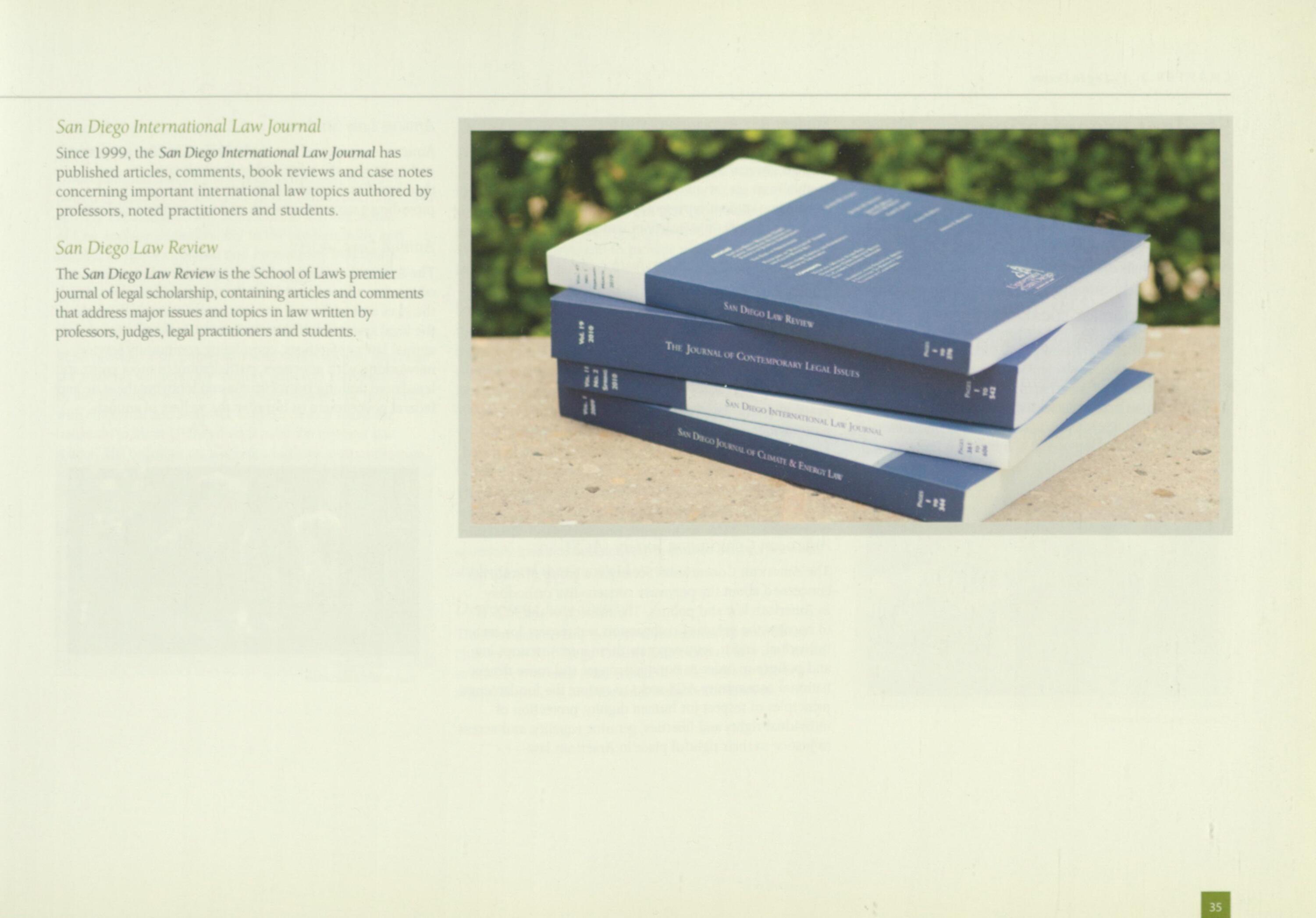
Since 1999. the San Diego International Law Journal has published articles, comments, book reviews and case notes concerning important international law topics authored by professors, noted practitioners and students.
San Diego Law Review
The San Diego Law Review is the School of Law's premier journal of legal scholarship, containing articles and comments that address major issues and topicsin law written by professors, judges, legal practitioners and students.
Student organizations

Student organizations not only serve various interest groups at USD School of Law but also develop a sense of community among their members. The active groups promote leadership, conduct orientation programs, provide study assistance, represent group concerns, sponsor speaker programs and promote community relations. Here, you have access to leadership roles that will further prepare you for a prestigious legal career.
Student Bar Association (SBA)
The SBA, of which all law students are members, is the student government of the School of Law. SBA council members sit on various university committees, act as official law student representatives and advocate for student interests on a variety of issues.
American Association for Justice (AAJ)
The American Association for Justice promotes oral advocacy skills for all students through intramural tournaments, mock trials and trial team competitions.
American Bar Association (ABA)
The ABA is the largest professional organization for practicing attorneys. With more than 400,000 attorneys nationwide, nearly half of all lawyers are members. The Law Student Division is a way for students to get involved while completing their law studies. Members meet other students and lawyers with common interests and learn about various career opportunities.
American Constitution Society (ACS)
The American Constitution Society is a group of students concerned about the pervasive conservative orthodoxy in American law and politics. The mission of the ACS is to harness the values of compassion and respect for each individual, and to reincorporate them into American law and politics in order to build a stronger and more decent national community. ACS seeks to restore the fundamental principles of respect for human dignity, protection of individual rights and liberties, genuine equality, and access to justice to their rightful place in American law.
Amicus Law Students
Amicus is a group of law students dedicated to supporting and nurturing the relationship between students and their families throughout the law school experience by providing a support network and sponsoring social events.
Animal Law Society
I he Animal Law Society seeks to provide a forum for education, advocacy and scholarship aimed at protecting the lives and advancing the interests of animals through the legal system. Activities include: attending national animal law conferences, completing communityservice, networking with attorneys, participating in moot court and legislative drafting competitions and lobbying the state and federal government to improve the welfare of animals.
CHAPTER 2 | Dig In Deeper
Student Bar Association
Asian Pacific American Law Students Association (APALSA)
Understanding that a diverse legal profession is better poised to address the concerns of the community, APALSA actively encourages many points of view at the School of Law and supports diversity in the student body and faculty. To further cultural and community awareness, APALSA sponsors activities including speaker panels, debates and workshops.
Black Law Students Association (BLSA)
BLSA provides a support group with which African American law students will uniquely identify although membership by any student is welcome. First-year students are provided with emotional and academic support asthey make the transition to life at USD and undertake the rigors of law school. The organization also helpsfacilitate communication and understanding among the variousraces, cultures and backgrounds represented at the law school.
Business Law Society
The Business Law Society provides a forum for students to share ideas and further explore and educate themselves in the area of business-related law. The organization offers opportunities to interact with various legal practitioners in the community, faculty and staff, and local corporate counsel through guest speaker engagements, panel discussions, seminars and other sponsoredevents.
Christian Legal Society (CLS)
CLS provides mutual support, encouragement, fellowship and spiritual growth for students at the law school who identify themselves as followers of Jesus Christ. Members strive to more faithfully live out that commitment in their personal and academic lives, to prepare for future lives as Christian attorneys, and to provide witness and outreach for Jesus Christ in the law school community.
Comparative Law Forum
Founded by the comparative law graduate students, this organization promotes the study of foreign and comparative law at USD. The forum sponsors public lectures, informal gatherings and develops support for the Master of Laws (LL.M.) in Comparative Law program in the international and local communities.
Criminal Law Society
The Criminal Law Society was formed to provide a resource for students interested in pursuing criminal law from both the defense and prosecution sides. The society sponsors speakersand actively promotes liaisons between students and the Criminal Law Bar.
Democratic Law Society
The Democratic Law Society is recognized as an official club by the San Diego County Democratic Party and hosts several events each year, which include visits to the law
Diversity Committee
The Diversity Committee works to promote diversity and respect through unity by bringing together the rich variety of students that comprise the law student body. All students are welcome to join this organization, which strives to create an inclusive and aware student body by facilitating and strengthening the relationship between USD's diversity-based law student organizations.
Environmental Law Society (ELS)
ELS strives to expose students to all facets of environmental practice and sponsors discussions on current issues in environmental law. ELS encourages its members to gain practical experience by offering many opportunities to work with local attorneys on pro bono environmental cases. The main goal of the ELS is to give students a feel for what it is like to practice in this field.
 Environmental Law Society
Environmental Law Society
Federalist Society
The Federalist Society for Law and Public Policy Studies is a group of conservatives and libertarians interested in the current state of the legal order. It is founded on the principles that the state exists to preserve freedom, that the separation of governmental powers is central to our Constitution, and that it is emphatically the province and duty of the judiciary to say what the law is, not what it should be.
Health Law Society (HLS)
The Health Law Society provides a forum for law students to learn more about current issues in health law and the health care industry.
Intellectual Property Law Association
The Intellectual Property Law Association provides a forum for the discussion of issues relating to science, technology and the law. Through discussions, lectures and social events, the society seeks to educate the campus community about these issues and their impact on the practice of law. The association is committed to encouraging interaction between students and other members of the legal community who share common interests in intellectual property issues.
Intramural Sports
International Human Rights Law Society (IHRLS)
IHRLS is dedicated to informing law students at USD of international human rights issues and career opportunities through meetings, speakers, films, events, community opportunities as well as lectures at the Joan B. Kroc Institute of Peace &r Justice on USD's campus.
International Law Society (ILS)
International law is a growing and dynamic area of practice. ILS presents a forum for interested students, faculty and practicing lawyers to discuss issues and opportunities in international law. Contact with practitioners and international organizations is arranged for members, contributing to their understanding of the establishment of effective rules of international law.
Intramural Sports
Intramural Sports provides students with a healthy break from class and homework by allowing them to participate, as competitor or observer, in semicompetitive sportsand activities while also networking and socializing with their fellow classmates. SBA sponsors intramural programs for law students at various athletic levels. Activities include year-round Softball leagues (competitive and co-recreational), competitive basketball, scramble golf tournaments and opportunities to form soccer, flag football, roller hockey and tennis teams. Weekly games throughout the semester give law students a chance to develop camaraderie with fellow students outside the classroom.
Jewish Law Students Association QLSA)
ILSA provides Jewish law students,and anyone interested in the Jewish religion and culture, an opportunity to explore educational and social interests unique to Jewish students.JLSA is committed to providing a supportive atmosphere, especially during holiday and festival periods when students are away from their families.
J. Reuben Clark Law Society QRCLS)
JRCLS gives members of the Church of Jesus Christ of Latter-Day Saints, and anyone else interested, the opportunity to socialize, learn and serve through various planned activities throughout the year. Activities include a weekly institute class, a bi-annual meeting of the J. Reuben Clark Law Society, and other social and community service events.

CHAPTER 2 | Dig In Deeper
La Raza Law Students Association
La Raza provides academic support to its members, particularly first-year law students, and helps members excel in law school. The organization sponsors varioussocial events and gatherings that bring understanding to all law studentsabout issues that affect the Latino community.
Law Students for Reproductive Justice (LSRJ)
LSRJ strives to provide USD law students with the education and training necessary to become successful, powerful advocates for reproductive justice The reproductive justice movement works to ensure that every individual has the ability to make and execute voluntary, informed decisions about one's sexual and reproductive health free from discrimination, coercion and violence, and irrespective of race, gender, sexuality religion, nationality or economic status.
Lex Inter Alia
Lex Inter Alia, which in Latin means "law amongst other things," is a student club that brings to campus attorneys who have their law degrees but have put them to use outside the practice of law The club's main goal is to showstudents the vast opportunities in every industry available to them upon graduation.
Middle Eastern Law Students Association (MELSA)
The Middle Eastern Law Students Association (MELSA) is dedicated to creating a forum for networking between MELSA members and attorneys practicing in San Diego. MELSA's mission is to stay connected and maintain a sense of unity, while fostering mutual understanding between the diverse cultures and backgrounds represented at USD. Students of all backgrounds and ethnicities are welcome to join.
National Lawyers Guild
The USD Chapter of the National Lawyers Guild is dedicated to the support and defense of economic and social justice. The organization seeks to educate students and the community about issues affecting economic and social justice and provides law students with pro bono opportunities in support of these goals.

Negotiations/Mediation Club
The Negotiations/Mediation Club provides training in negotiating tactics and tournament rules to give those interested in negotiation or mediation a chance to begin developing the skills they will need in practice. Teams are selected to compete in a variety of tournaments. Winners from smaller intramural tournaments will travel to regional, national and international competitions. This traveling team is restricted to second- and third-year students, but all are welcome to participate in or watch intramural tournaments.
Phi Alpha Delta (PAD)
Thomas More Society
The Thomas More Society is a Catholic law student organization and the student chapter of the Catholic attorneys' group. The society hosts weekly social meetings and a Sunday Mass for students that is held on campus. Every semester, national speakers are brought to LSD to address issues of concern to Catholic law students.
A community service organization, PAD is the world's largest professional legal fraternity serving students, law schools and the profession This international organization offers professional programs, student loans, job preparation, job placement assistance, insurance programs, a quarterly publication, conventions, conferences, awards and lifetime friendships.
Thomas Mott Society
Phi Delta Phi (PDP)
Phi Delta Phi is an honor fraternity to which students with a minimum academic standing or service commitment are invited. Established in 1869, PDP is the oldest professional fraternity in the western hemisphere and many leaders of the bench, bar and law schools are members. The fraternity offers tangible benefits including scholarships, student loans, regional and international meetings and conventions.
Pride Law
Pride Law provides a forum for bisexual, gay and lesbian law students and their friends for informal gatherings and social eventsas well as educational and networking activities. Pride Law helps connect gay and lesbian law students with the San Diego community and serves as a resource for understanding and dialog within the university community.
Pro Bono Legal Advocates (PBLA)
PBLA is an organization dedicated to giving legal assistance to the local community. Through its programs, PBLA brings legal help to those who would otherwise be lost in the legal system or might not be able to afford competent counsel.
Public Interest Law Foundation (PILF)

PILF promotes the practice of public interest law by educating USD students about public interest career and volunteer opportunities, and by encouraging students and alumni to support public interest law through volunieerism and donations. Members of PILF conduct an annual pledge drive to raise funds for USD's Loan Repayment Assistance Program (LRAP). LRAP helps USD graduates who work for qualifying nonprofit public interest organizations repay their law school loans. PILF also sponsors educational events andseminars on public interest issues and opportunities.
READ San Diego
READ San Diego trains volunteer reading partners to work with elementary K-5th grade students to help foster love of reading and enhance their reading skills. Members commit to working on a one-on-one basis with children identified by their teachers as "reluctant readers" for one hour a week during the school year.
Republican Legal Society
1he Republican Law Society is an organization that discusses the political system and current issues facing the country. The organization invites many keynote Republican speakers to discuss current issues in a free and open debate.
South Asian Law Student Association (SALSA)
SALSA is a student group that serves as a forum to connect those in the Law School who identify with, or are interested in, South Asian culture and/or legal issues. SALSA welcomes all law students with an interest to join and participate in its various networking and social events.
CHAPTER 2 | Dig In Deeper
READ San Diego
Sports and Entertainment Law Society (SELS)
SELS explores various aspects of entertainment and sports law, while bringing to light more diverse and eclectic areas of practice. The society provides a realistic introduction to the entry-level entertainment and sports market for today's law student.
Surf Law Society

Only in California. Mote than 100 students participate in the Surf Law Society's functions, which include local surfing activities as well as trips to Baja California.
Tax Law Society
The Tax Society is for J.D. and LL.M. students who are interested in promoting tax law, as well as providing a resource to those interested in tax at any level. The society invites speakers and promotes associations with the local bench and bar.
Veteran Law Students Association
The University of San Diego Veteran Law Students Association is composed of law students who have had previous military service, are on active or reserve duty, or are interested in becoming military judge advocates or otherwise serving in the armed forces. The organization's goals are to provide a support group for former, present, and future military personnel and their families, and to establish a foundation for veterans' interests at the University of San Diego School of Law.
Women's Law Caucus
WLC addresses the special needs and interests of women in law ranging from affirmative action to career enhancement. The group promotes professionalism and provides opportunities for networking, socializing and exploring areas of interest. Functions include self- improvement seminars, fund-raising events, socials and speakers such as judges, lawyers and other law professionals.
Surf lave Society
CHAPTER 3

In Good Company

American University
Arizona Slate University
Azusa Pacific University
Boston College
Boston University
Brandeis University
Brigham Young University
Brigham Young University, Hawaii
Bucknell University
California Lutheran University
California Maritime Academy
California Polytechnic State UniversityPomona
California Polytechnic State UniversitySan Luis Obispo
California State UniversityFresno
California State UniversityFullerton
California State UniversityLong Beach
California State UniversitySan Marcos
Carnegie Mellon University
Chapman University
Clark University
Colby College
College of Charleston
College of Saint Benedict
Columbia University
Cornell University
Dartmouth College
Dickinson College
Duke University
Emerson College
Florida State University
George Washington University
Georgetown University
Gonzaga University
Harvard University
Illinois State University
Indiana Univetsity-
Bloomington
Loras College
Loyola Marymount University
Loyola University-Chicago
Malone College
Michigan State University
Middle Tennessee State University
Montana Slate University
Morehouse College
Mount Saint Mary's College-
Calif.
Northern Arizona University
Northwestern University
Ohio Stale University-
Columbus
Ohio University
Old Dominion University
Oregon State University
Pennsylvania State University
Pepperdine University
Pitzer College
Pomona College

Portland State University
Princeton University
Reed College
Rutgers University
San Diego State University
Santa Clara University
Stanford University
SUNY at Binghamton Center
SUNY at Stony Brook Center
SUNY College at Cortland
Syracuse University
Texas A & M University
Texas Christian University
Tulane University
United States Air Force Academy
University Of Arizona
University of CaliforniaBerkeley
University of CaliforniaDavis
University of CaliforniaIrvine
University of California-
Los Angeles
University of CalifomiaMerced
University of CaliforniaRiverside
University of CaliforniaSan Diego
CHAPTER 3 | In Good Company
Many of the best undergraduate institutions are well represented at USD School of Law. Here, you'll be in good company attending law school with students from across the country. The 2010 entering class included graduates of the following colleges and universities:
University of CaliforniaSanta Barbara
University of CaliforniaSanta Cruz
University of Central Florida
University of Chicago
University of ColoradoBoulder

University of Delaware
University of Denver
University of Florida
University of Illinois
University of Mary Washington
University of Massachusetts
University of Miami
University of Michigan
University of Minnesota
University of Missouri
University of Nebraska
University of Nevada-Reno
University Of North Carolina
University of North Florida
University of Northern Iowa
University of Notre Dame
University of Pennsylvania
University of Redlands
University of San Diego
University of South Carolina
University of Southern California
University of Texas
University of the Pacific
University of Vermont
University of Washington
University of Wisconsin
Utah State University
Washington University
Wellesley College
Western Washington University
Westminster College
Wheaton College
Williams College
Winona State University
Yale University
York College of Pennsylvania
Within nine months of graduation, 94 percent of USD School of Law Class of 2009 was employed with a reported average annual salary of $94,859 or was enrolled in a master of laws (LL.M.) degree program.
Whether you're a student or a USD School of Law alumnus, the Career Services office can help you. As a student, you'll have access to hundreds of resources and programs to help you gain legal experience while attending law school. The department's advisors—all of whom are experienced attorneys—are committed to helping you achieve your individual career objective through one-on-one advising sessions, mock interviews and career skills workshops. Here, you'll get the training you need to nail that important interview.

CHAPTER 3 | In Good Company
Below is a sampling of the top law firms, corporations and government agencies who actively recruit our graduates:

Allen Matkins
Baker Bolts
Bingham McCutchen
Cooley
Dechen
DLA Piper
Ernst &rYoung
Foley &rLardner
Gordon & Recs
Jones Day
Knobbe Manens
Luce Forward
McKenna Long & Aldridge
Morrison & Foerster
Paul Hastings
Qualcomm
Sheppard Mullin
Sony
U.S. Department of Justice
White & Case
Alston • Bird
Baker & McKenzie
California Department of Justice
Covington & Burling
Deloitte
Dorsey & Whitney
Fish & Richardson
Gibson. Dunn & Crutcher
Internal Revenue Service
KPMG
Latham & Watkins
McDermott Will & Emery
Mintz Levin
Omck
PncewaterhouseCoopers
Sempra Energy
Snell & Wilmer
Trout manSanders
U.S. Securities & Exchange Commission
Wilson Sonsini
For more information, please see the career services Web site at law.sandiego.edu/careers
What are they doing now?
59.4 percent of USD
Class of 2009 work for private law firms
13 4 percent for businesses outside of law
9.1 percent for local, state and federal government
9.1 percent in academia
5.8 percent for public interest law organizations
2.9 percent as judicial clerks
(0.3 percent are unknown)
USD School of Law alumni live and work in more than 300 cities throughout the 50 United States and 58 countries around the world.
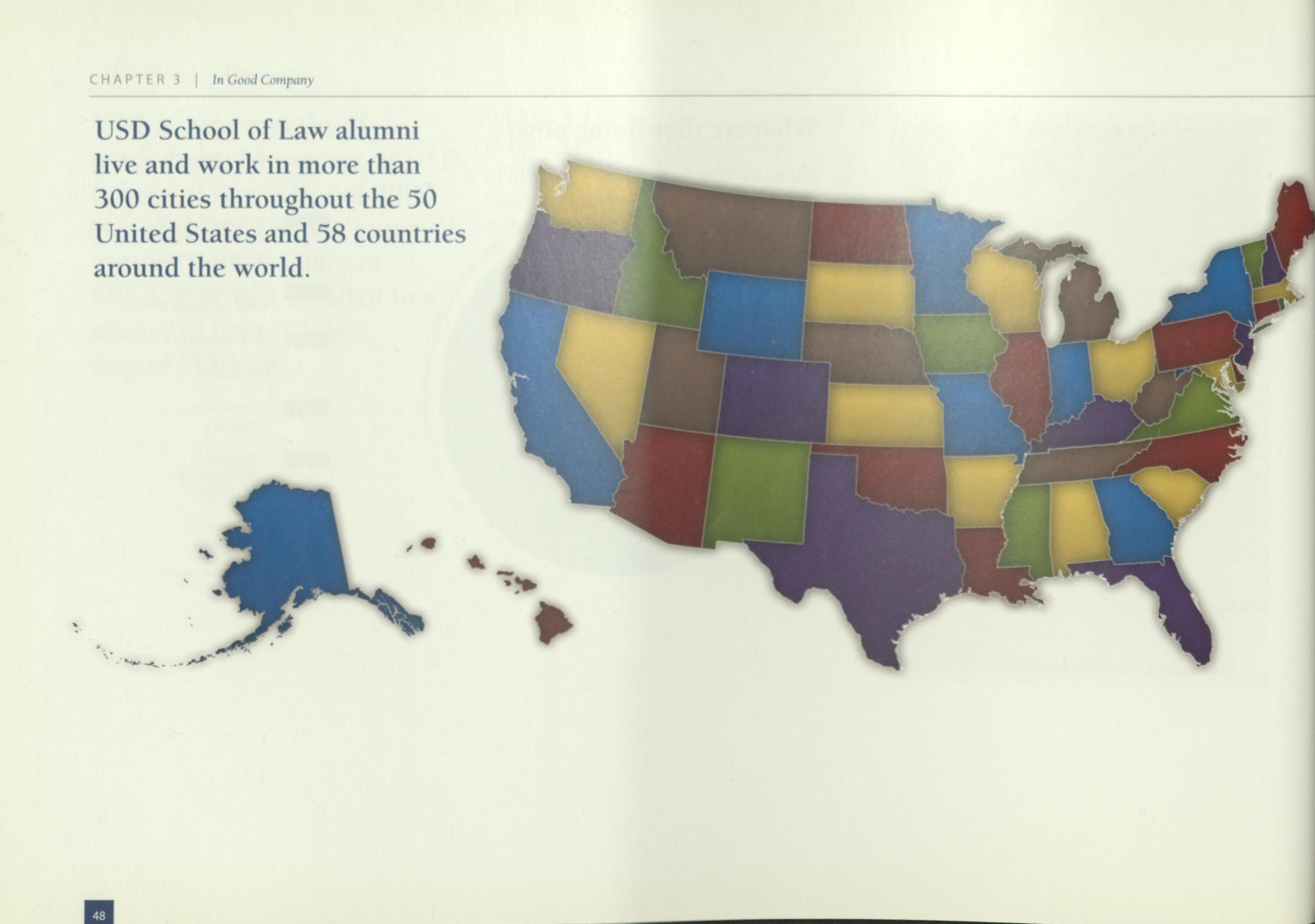
CHAPTER 3 | In Good Company
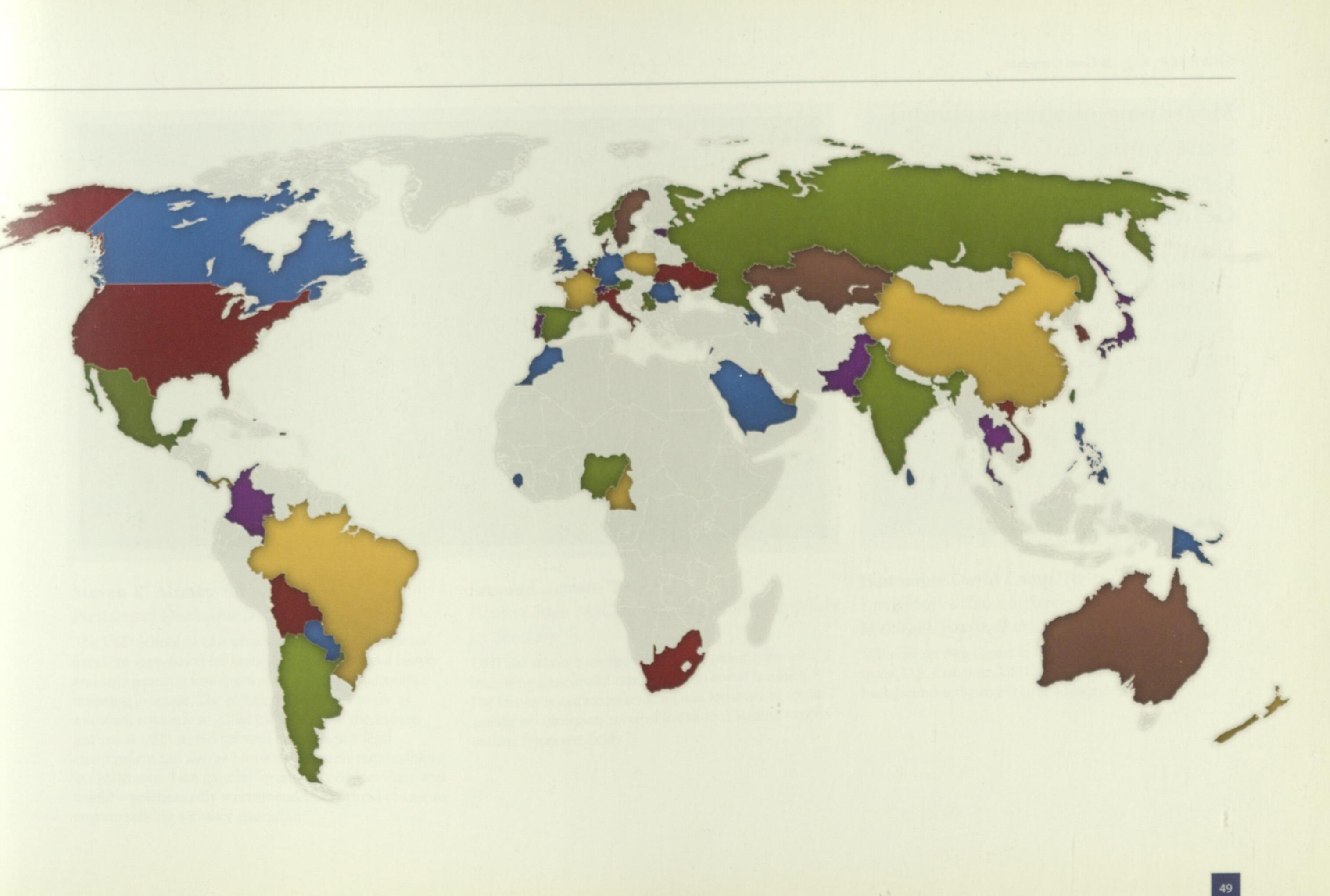
Meet some of our top alumni... State Supreme CourtJudge. Congressman. Attorney General. CEO. U.S. Homeland Security Advisor. U.S. Attorney.
These are just a few of the titles held by the more than 13,000 USD School of Law distinguished alumni who work throughout the country and around the world. Here,
you're in good company

CHAPTER 3 | In Good Company
Steven
R. Altman '86 President of Qualcomm Incorporated
"The USD School of Law program provided me with an excellent foundation for launching my career as a lawyer and subsequently forming and overseeing Qualcomm's licensing program. The principles imparted to me as a student continue to guide me today, and the lessons learned at USD served me well not only in a legal environment but also as 1 took on business responsibility at Qualcomm. 1 am grateful for my experiences there and would wholeheartedly recommend USD School of Law to anyone seeking a quality education."
Leonard Armato '78 Fitness Group President and Chief Marketing Officer
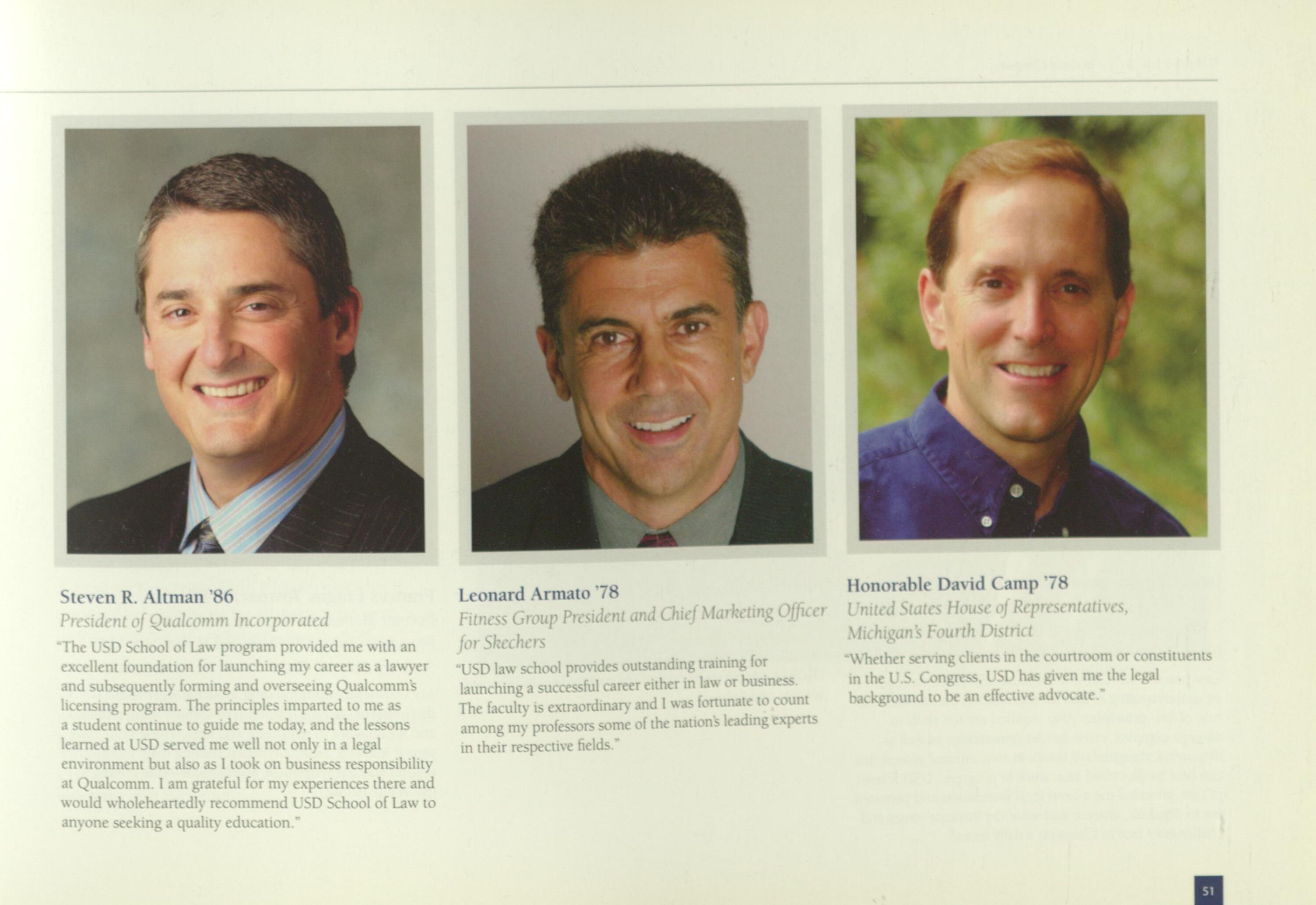
for Skechers
"USD law school provides outstanding training for launching asuccessful career either in law or business
The faculty is extraordinary and 1 was fortunate to count among my professors some of the nation's leading experts in their respective fields.
Honorable David Camp 78
United States House of Representatives, Michigan's Fourth District
"Whether serving clients in the courtroom or constituents in the U.S. Congress, USD has given me the legal background to be an effective advocate."
Partner, Squire Sanders & Dempsey in Beijing, China and Chairman of the Ameiican Chamber of Commerce (AmCham-China)
in Beijing
"Law practice with an international firm in China requires an understanding of and an appreciation for fundamental rule-of-law principles. Also required are the skills to manage complex, cross-border transactions as well as disputes and regulatory issues in an economic system that can best be described as a 'work in progress.' USD School of Law provided me a keen legal foundation and prepared me to organize, analyze and solve the intricate issues and challenges 1 face in China on a daily basis."
"I have always valued my USD Law experience for all it did to equip me for my life in the law. USD was intellectually challenging and started us on our path to become evolved lawyers and judges."
M> I SD legal education taught me the rigor and discipline of analysis. I learned to identify vulnerabilities and weaknesses in reasoning and facts. These skills have sened me well, especially when reading daily intelligence repons and terrorist threat information while serving at the White House."
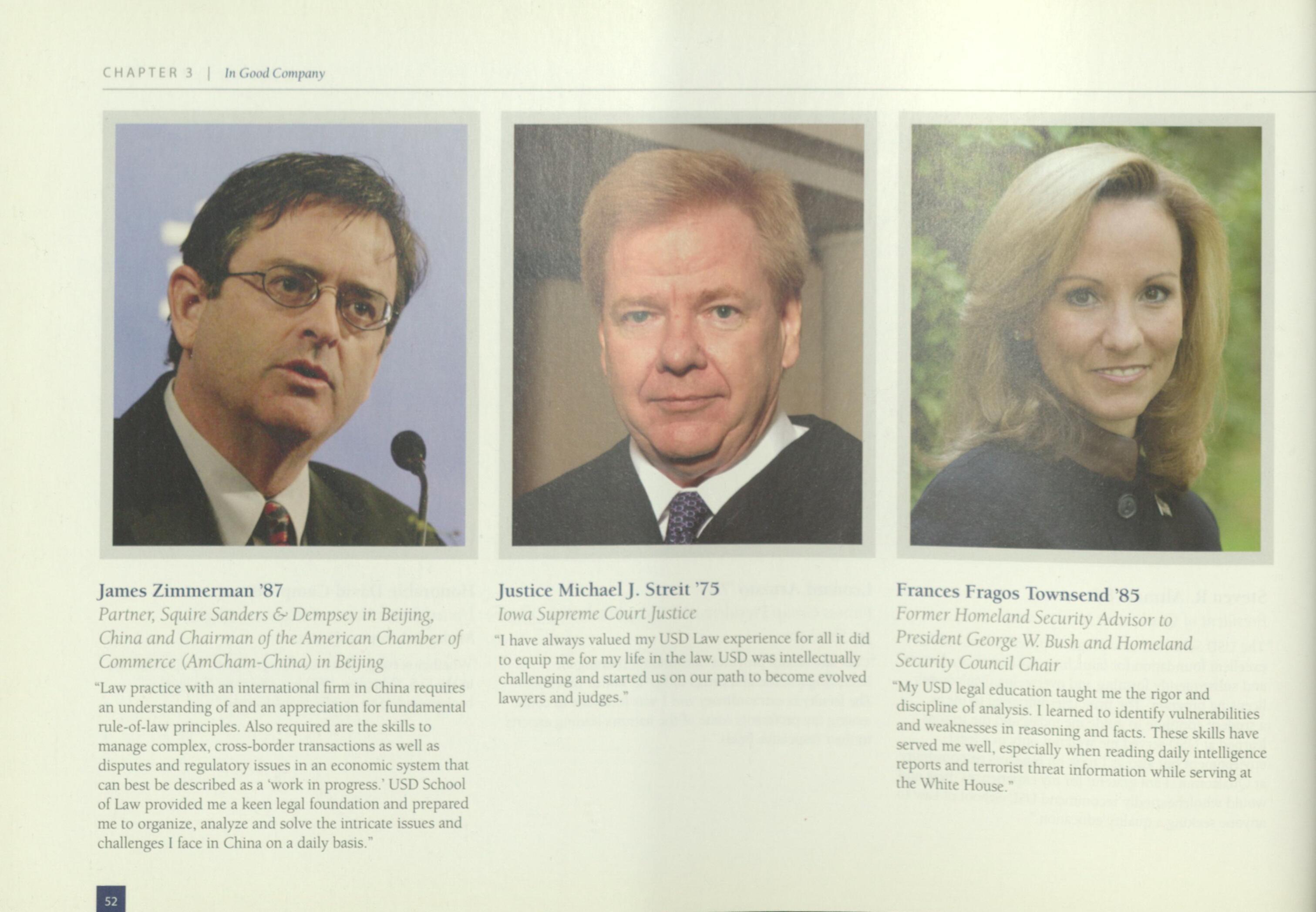
CHAPTER 3 | In Good Company
James Zimmerman '87
Justice Michael J. Streit '75 Iowa Supreme Court Justice
Frances Fragos Townsend '85
Former Homeland Security Advisor to Piesident George W Bush and Homeland Security Council Chair
How can alumni help me?
Led by the Law Alumni Board, the USD School of Law Alumni Association is actively engaged in enhancing the student experience by volunteering their time to foster professional connections between studentsand alumni. The group hosts networking events held throughout the year including the annual Careers in the Law event, which brings together more than 100 practicing attorneys with current students, and the Lunch and Learn lectures, which provide students an opportunity to interact with industry experts and ask questions about key legal issues.
As a USD School of Law student, you will receive exclusive access to the Alumni Advisor Directory. This index provides contact information to alumni who are willing to speak with you about their own career experiences, areas of practice or information about their geographic region. With more than 13,000 alumni, the law school boasts an impressive array of professionals who are leaders in business, law and the judiciary.

CHAPTER 4
Costs and Financial Assistance

YOU ARE HERE
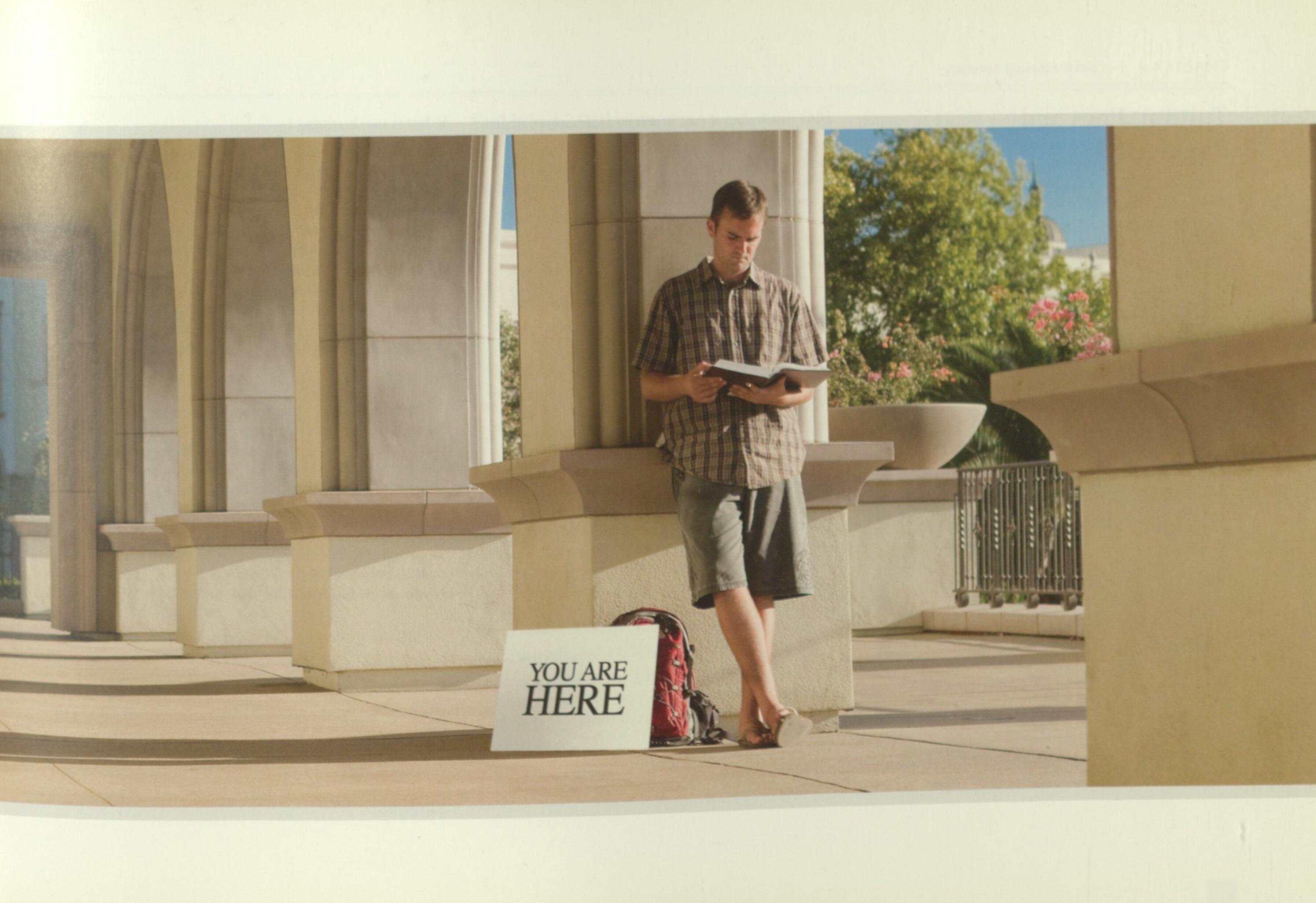
Tuition, Fees and Financial Aid
How much does it cost to attend USD School of Law?
Law school is an investment that can pay off over a lifetime. As tuition rates may change from year to year, up-to-date details on fees and tuition can be found online at law.sandiego.cdu/tuition.
Can I afford law school?
If you've thought about attending but aren't sure how to pay for it, there are numerous resources that can help you.
What forms of financial aid are available at USD?

A wide variety of loans, scholarships, fellowships, sen-ice grants and work-study programs are available for financially-eligible students. Financial aid awarded to lawschool students at USD consists of more than 370 meritbased, need-based and/or diversity-based scholarships; federal sources such as work-study programs; the Perkins and Direct Loan Programs; and institutional loans. Private loan programs are also available to assist law students with supplementalfinancing for legal education expenses.
What is work-study?
1he Federal Work Study (FWS) Program provides parttime, on- and off-campus, temporary employment for students whodemonstrate financial need. Funding for this program is provided by the federal government and the 1'niversity of San Diego School of Law. A typical Federal Work-Study award is $4,000 per student per academic year. The award is not paid at the start of the semester. Students are paid hourly for their work throughout each semester Students participating in the program have an opportunity to reduce their loan indebtedness and, in many positions, obtain relevant legal experience.
What are service grants?
I he law school sponsors a Summer Community Service Employment Program that enables students to work for c ommunity service agencies.Students that are awarded these grants are paid hourly for their work throughout the summer. Subject to the availability of funding, positions are awarded annually to upper-division students who complete the application process.
For complete details about the many types of financial aid available to law students at USD, go to law.sandiego.edu/financiaLaid.
CHAPTER 4 | Costs & Financial Assistance
Who is considered for financial aid?
You are automatically considered for need-based as well as merit-based scholarships. The policy of USD is to focus scholarship assistance on students with outstanding academic merit or promise, who contribute to diversity in the legal profession, and/or have the greatest financial aid need. Need is calculated by subtracting the applicant's available resources, including those of his or her spouse, from a standard budget that includes estimates of all costs associated with completing one year of law study.
How many students receive financial aid at USD?
Approximately 85 percent of USD law students received some form of financial aid. The majority of those students receive financial aid support in the form of loans.
How do I apply for financial aid?
All applicants:
1) Complete the Free Application for Federal Student Aid (FAFSA) or a Renewal FAFSA online at www.FAFSA.ed.gov.
2) On the FAFSA document, designate the USD School of Law (code G06976) as a recipient of the processed form.

3) Submit the processed FAFSA as soon as possible. It must be stamped as received by the Central Processing Center on or before March 1 for priority consideration.
Admitted applicants:
1) Complete the USD School of Law Institutional Financial Aid Application, which is included in the registration packet.
2) For priority consideration, applications must be postmarked by March 1 or within two weeks of notice of admission, whichever is later.
Early applicants receive priority and financial aid decisions are made independently from admission decisions.
How do I know if I
received financial aid at USD?
Financial aid awards are communicated in the form of an e-mail offer of assistance to admitted students beginning in mid-March. Typical awards may contain a combination of funding, including loans, scholarships and/or work study.
Are admissions decisions linked with financial aid decisions?
No. Admission decisions are made independent of financial aid decisions. In order to prevent students from missing deadlines, it is recommended that students apph for financial aid before they are notified of their admission to the University of San Diego School of Law.
Can I defer my undergraduate loans while attending law school?
Outstanding student loans may qualify for deferment and/ or forbearance provisions. Ask your financial aid counse or about how to formally request a deferment or forbearance.
Where can I learn more about financial aid?
Go to the financial aid section on our Web site at law.sandiego.edu/financial aid With a wide variety of financial information, our site is a good place to get started. You can e-mail questions to lawaid@sandiego.edu as well. USD School of Law also has financial aid advisors who can help you plan for the future. Visit the Web site or call (619) 260-4570 to schedule an appointment.
CHAPTER 5
Getting Here
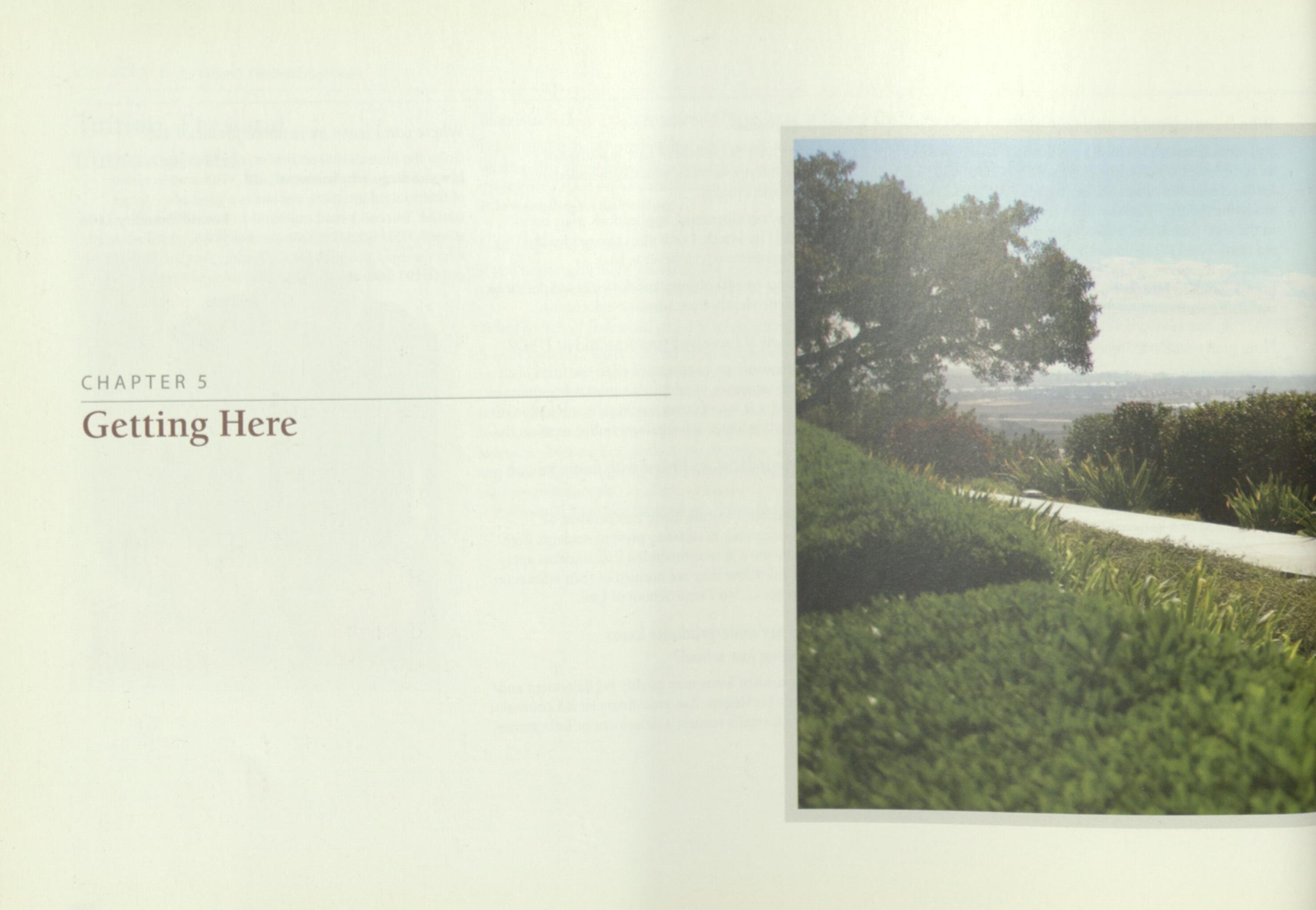

How do I apply to USD School of Law?
Applying to law school can be intimidating. We've created an easy-tofollow checklist to help you gather and organize the required information.
Regular Admissions (Rolling): It is the responsibility of applicants to ensure that the School of Law Admissions Office receives application materials before the regular admissions priority filing date of February 1. Applications submitted after February 1 are still given consideration, but they are considered after those filed before the deadline.
Eady Decision: Applicants are required to submit a completed application including an LSAT score report as well as a Credential Assembly Service (CAS) Report by December 1. Details about the early decision program can be found in the application materials.
Take the Law School Admission Test (LSAT), which is given four times a year at various centers throughout the country and around the world. For more information, go to www.LSAC.org.
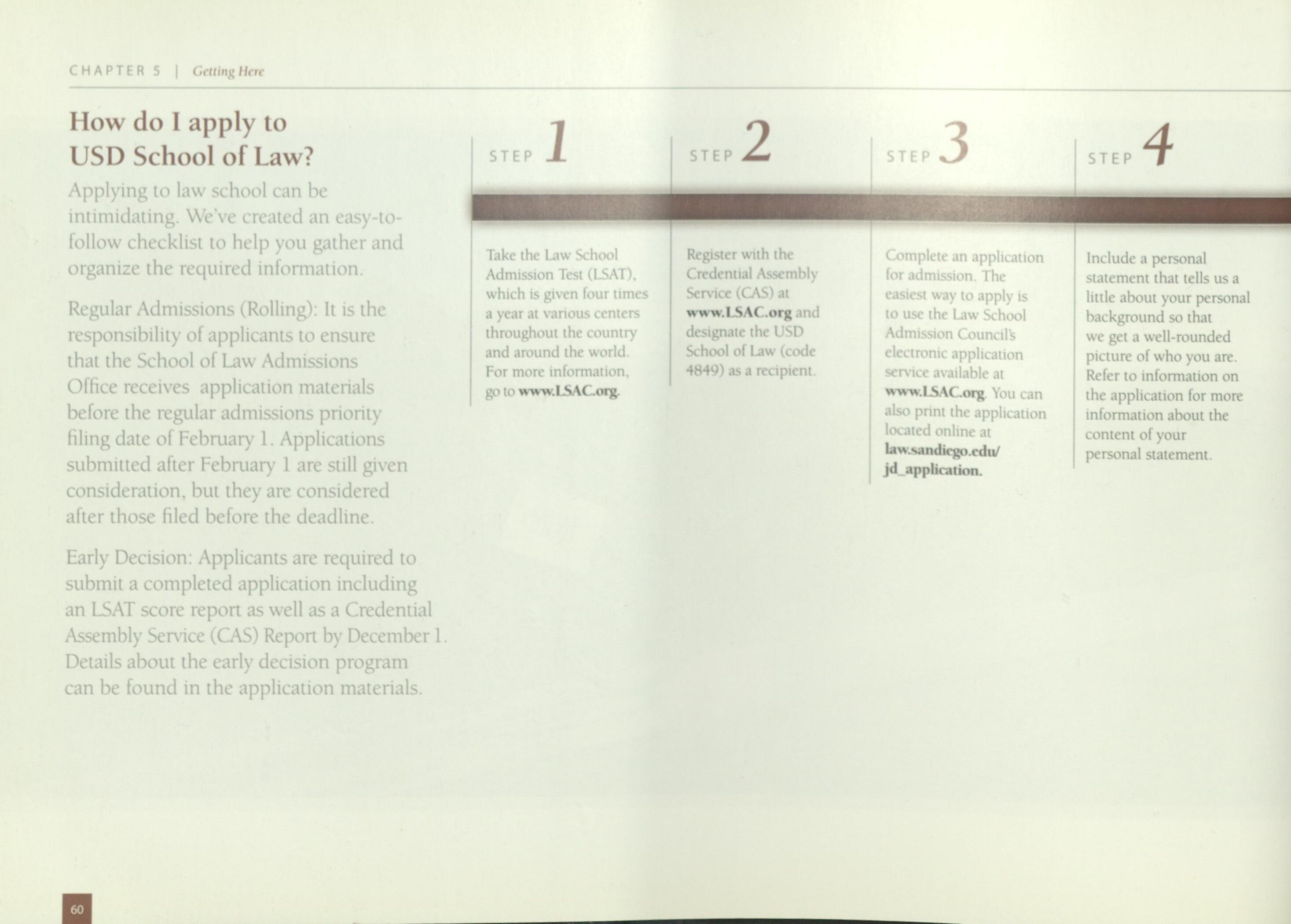
Register with the Credential Assembly Service (CAS) at www.LSAC.org and designate the USD School of Law (code 4849) as a recipient.
Complete an application for admission. The easiest way to apply is to use the Law School Admission Councils electronic application service available at www.LSAC.org You can also print the application located online at law.sandiego.edu/ jd application.
Include a personal statement that tells us a little about your personal background so that we get a well-rounded picture of who you are. Refer to information on the application for more information about the content of your personal statement.
CHAPTER 5 | Celling Here
Visiting students should provide a letter of permission from their home school.
Letters of recommendation are not required, but are certainly welcome. Choose letters from professors or individuals who can best evaluate your academic background and/or work experience and have them sent toCAS at www.LSAC.org.
If applying electronically, you can pay the non-refundable $50 application fee by credit card through LSAC.
STEP 8 STEP STEP 10
Check the application checklist at the end of the application to ensure everything iscomplete.
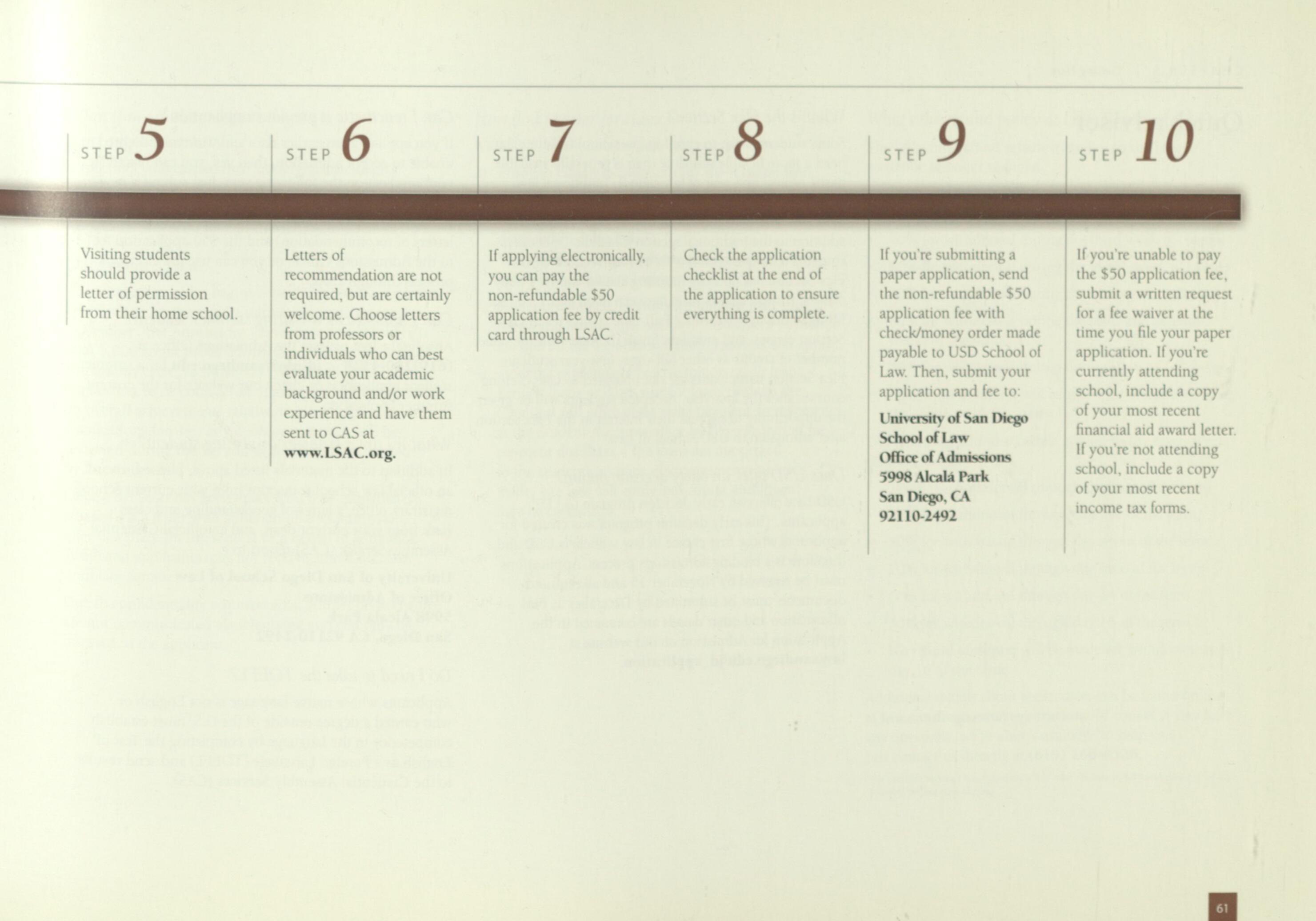
If you're submitting a paper application, send the non-refundable $50 application fee with check/money order made payable to USD School of Law. Then, submit your application and fee to:
University of San Diego School of Law Office of Admissions
5998 Alcala Park San Diego, CA 92f10-2492
If you're unable to pay the $50 application fee, submit a written request for a fee waiver at the time you file your paper application. If you're currently attending school, include a copy of your most recent financial aid award letter. If you're not attending school, include a copy of your most recent income tax forms.
Quick advisor
What is the Flex Section?
Some students wish to enroll in law school full-time, but need a more flexible schedule than is generally available in the typical first year of law school. Traditional law school sections require students to attend classes between 8:30 a.m. and 5:00 p.m., Monday through Friday In addition to the traditional section schedule, USD offers students a unique option with its Flex Section. USD's Flex Section has no early moming classes and no Fridayclasses. Instead classes meet between noon and 7:30 p.m., Monday through Thursday. Full-time faculty teach Flex Section classes, and enrollees finish the year with the same number of credits as other full-time, first-year students. Flex Section participants are not obligated to take evening courses after the first year. Accepted students will be given the opportunity to express their interest in the Flex section after admission to USD School of Law.
Does USD offer an early decision option?
USD Law offers an early decision program to J.D. applicants. This early decision program was created for applicants whose first choice in law schools is USD and therefore is a binding admissions process. Applications must be received by November 15 and all required documents must be submitted by December 1. Full information and other details are contained in the Application for Admission on our website at law.sandiego.edu/jd_application.
Can / reactivate a previous application?
If you applied at an earlier date and were not accepted or unable to accept admission, then yes, you can reactivate your application the following year. Just submit a new application form, an updated Credential Assembly Service (CAS) report, any supplementary materials (resume or letters of recommendation) and the $50 application fee to the Admissions Office, or you can use the electronic process through LSAC.
Can I apply to be a visiting summer student?
Absolutely. Just contact the Admissions Office at (619)260-4528 or jdinfo@sandiego.edu for a summer student application or check our website for the current summer application.
What if lam a transfer or visiting student?
In addition to the materials listed above, please forward an official law school transcript from your current school's registrar's office, a letter of good standing and class rank from your current dean, and an official Credential Assembly Service (CAS) report to:

I niversity of San Diego School of Law Office of Admissions
5998 Alcala Park San Diego. CA 92110-2492
Do I need to take the TOEFL?
Applicants whose native language is not English or who earned a degree outside of the U.S. must establish competency in the language by completing the Test of English as a Foreign Language (TOEFL) and send results to the Credential Assembly Services (CAS).
CHAPTER 5 | Gelling Here
What if my undergraduate degree is from another country?
Applicants who earned their undergraduate degree outside the United States need to apply to LSAC for the J.D. Credential Assembly Service for Foreign-Educated Applicants and send foreign transcripts toJDCAS.
Did I get accepted?
The admissions office begins consideration of completed applications for the regular admissions cycle in late November. The Admissions Committee reviews more than 5,000 applications during this time for the regular admissions cycle, so it may take several months for your application to be considered. Each applicant is evaluated on overall achievements relative to other applicants.
Applications for the early decision program will be reviewed during the fall and decisions will be mailed by December 31.
Once a decision has been made, you'll be immediately advised via a letter with either an offer of admission, offer of a place on the waitlist or a denial of admission. Waitlisted applicants may not receive a final decision until late summer.
Due to confidentiality requirements, admission decisions are not communicated via telephone and can only be released to the applicant.
How do I register for classes?
It's simple.Just follow the following steps:
1) Enroll in classes as instructed by the registrar using USD's easy-to-use Banner online registration.
2) Pay the required tuition and fees on or before the published deadline. Visit sandiego.edu/studciitaccounts for payment options, including online payment.
3) Students using the monthly installment plan should follow the instructions outlined. Installment payments are due on the 1st of each month. Late fees will apply.
4) Students expecting to receive tuition credit loans, Perkins loans or other student loans through the Financial Aid office must make payment arrangements at the Student Accounts office by the registration fee payment deadlines if the loans are not posted to the student's account. If arrangements are not made, late fees will apply and course enrollment may be cancelled.
What's the refund policy at USD School of Law?
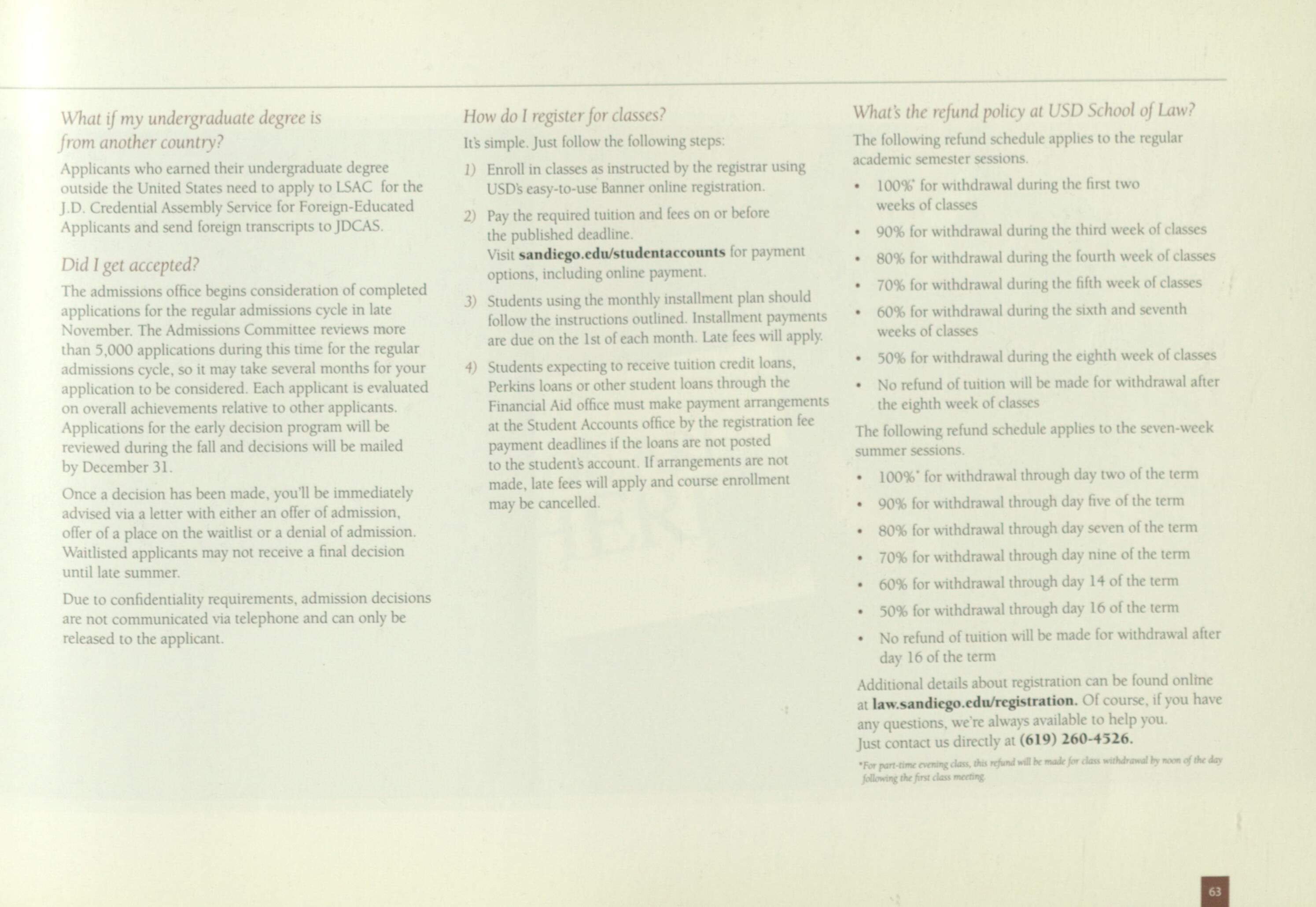
The following refund schedule applies to the regular academic semester sessions.
• 100%' for withdrawal during the first two weeks of classes
• 90% for withdrawal during the third week of classes
• 80% for withdrawal during the fourth week of classes
• 70% for withdrawal during the fifth week of classes
• 60% for withdrawal during the sixth and seventh weeks of classes
• 50% for withdrawal during the eighth week of classes
• No refund of tuition will be made for withdrawal after the eighth week of classes
The following refund schedule applies to the seven-week summer sessions.
• 100%' for withdrawal through day two of the term
• 90% for withdrawal through day five of the term
• 80% for withdrawal through day seven of the term
• 70% for withdrawal through day nine of the term
• 60% for withdrawal through day 14 of the term
• 50% for withdrawal through day 16 of the term
• No refund of tuition will be made for withdrawal after day 16 of the term
Additional details about registration can be found online at law.sandiego.edu/rcgistration. Of course, if you have any questions, we're always available to helpyou. Just contact us directly at (619) 260-4526.
•ForporMimr A®, d* I* "•«* **"«*<4'***» fallowing the first class meeting
CHAPTER 6
The Fine Print

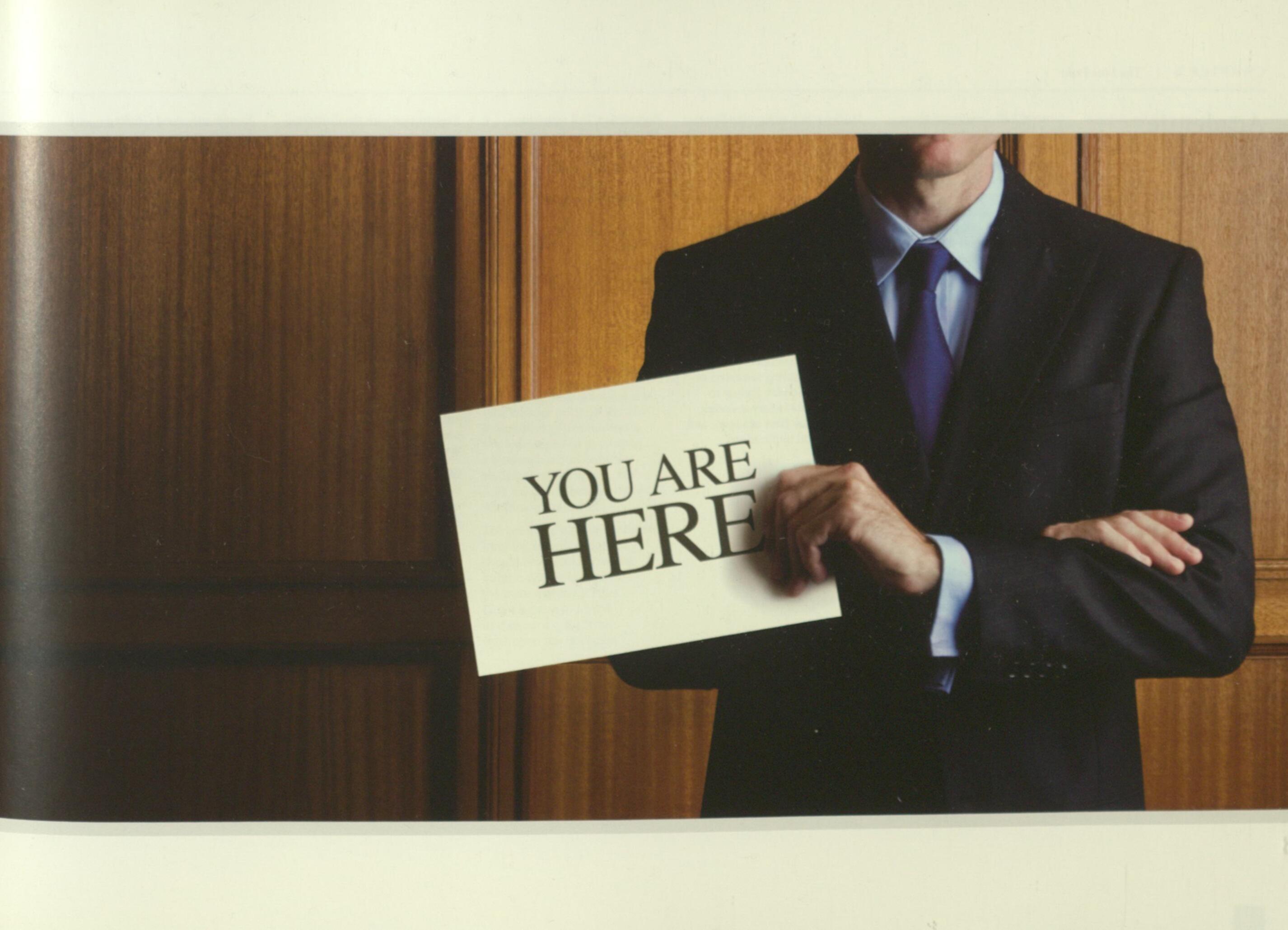
Academic Rules and Regulations.

General Rules and Regulations: Students are required to complete 85 course credits, 79 of which must be taken at USD School of Law. This includes successful completion of: 1) the residency requirements; 2) all required classes; 3) a professional skills class; 4) an in-depth writing requirement.
All first-year students must take the first-year required courses for the program in which they are enrolled. Full-time students may not enroll for more than 16 credits per semester.
Full-time students are expected to devote most of their nonclassroom time to the study of law and may not be employed more than 20 hours per week.
Full-time students may not enroll in more than six credits in the evening during anysemester.
Part-time program students may not enroll for more than 11 credits per semester.
After the first year, full- and part-time program students must successfully complete all required courses and a graded writingcourse involving indepth research in a selected area of study. The written work requirement may be fulfilled by satisfactory completion of a graded seminar paper or scholarly written work submitted to the San Diego Law Review, San Diego International Law Journal, or Journal of Contemporary Legal Issues on certification of the approving faculty member.
Students beginning their law studies in 2007 or later must pass a professional-skills elective from a list of such courses designated by the Dean. A course will be included on this list if it provides substantial instruction in the professional skills encompassed by ABA Standard for Approval of Law Schools 302(a)(4).
Students must be enrolled in a minimum of 14 academic credits in an academic year in order to maintain satisfactory academic progress. An academic year includes the summer following the fall and spring semesters of the academic year. Failure to maintain satisfactory academic progress may have academic and financial aid implications.
registration: Fall registration day is mandatory for first-year students. Continuing students may complete registration online or in person at the beginning of each semester All registration dates and deadlines can be found online at law.sandiego.edu/calcndar Late registration will result in an additional fee as set forth in the fee schedule. Registration is not complete until all tuition and fees due have been paid or an acceptable payment plan has been arranged with the university.
Registration with the California State Ba> Admission to and successful completion of law school does not ensure that students meet the eligibility requirements for admission to the bar Students are responsible for obtaining information about the registration requirements, evidence of good character and other qualifications for admission to practice in the state in which they intend to practice.
Candidates for admission to the State Bar of California must register with the Committee of Examiners for the California Bar no later than three months after beginning law study. Forms are available online from the committee of Bar Examiners at www.calbar.ca.gov.
Questions related to the forms can be directed to the Committee of Bar Examiners at the Los Angeles office at 1149 S. Hill Street, Los Angeles, CA 90015 or the San Francisco office at 180 Howard Street, San Francisco. CA 94105.
Students interested in taking the bar in a state outside of California should contact the Office of Admissions for the State Bar in the jurisdiction in which they are planning to practice for more information.
Examinations and Grading: For many courses, the grade is based largely on the semester examination, but midterm examinations or periodic written assignments may also be a component of the final grade. Practice examinations are given in the middle of the first semester of the first year. The ultimate grade for the course may be affected by classroom participation. In seminars and a few other courses, there may be no examination, with the grade being assessed largely on the basis of a research paper. Examinations are given under the honor system and are graded anonymously.
The University of San Diego School of Law uses a letter grading system with numerical equivalents. There is a required curve for all of its first-year and required courses. Some courses may be graded on a "pass/fail" or "honors/pass/low pass/fail" basis. In figuring a student's average, a fail is calculated as an F (1.0) and a low pass as a C- (1.67). There is nograde of incomplete. A student must fulfill the requirements for a course within the semester the student is enrolled in that course.
CHAPTER 6 | The Fine Print
Honors: Students who are in the upper 15 percent of the graduating class based on the total cumulative average receive an honors degree suitably inscribed. The student with the highest cumulative average receives a degree inscribed summa cum laude, and students in the top five percent graduate magna cum laude. The remaining 10 percent graduate cum laude. Students in the upper 10 percent of the graduating class are eligible for election to the Order of the Coif, a national legal honor society. Transfer and visiting students should check with the records office of their home school or the University of San Diego School of Law to determine the effect of a transfer or visit on their eligibility for honors.
Academic Standards, Probation, Disqualification and Rcadmission: First-year students must maintain a cumulative average of C (2.0) to be in good academic standing. A student whose cumulative average falls below C (2.0) will be academically disqualified subject to the exceptions stated in the Academic Rules. However, no student will be academically disqualified before the end of his or her second semester of law school. After the first year, a student whose grade point average is 1.9 or higher may petition for readmission.
Summer school grades are computed in the student's cumulative average at the end of the succeeding fall semester.
Students who complete the fall semester of their first year of law study, or their first year of lawstudy, or their second year of law study with less than a certain grade point average or who meet other criteria will be subject to mandatory academic supervision.
The specific rules regarding academic supervision, probation, academic disqualification and petitions for readmission are set forth in the academic rules of the School of Law. The rules are revised periodically and should be consulted by students who have questions about these particular issues. The academic rules are available online at law.sandiego.edu/ academic_rules.
If a student fails a required course, he or she must register, retake and achieve a passing grade to receive credit. If a student fails an elective course, he or she may choose to do the same. The cumulative average of students who fail a course and later pass after retaking it will be computed by averaging the grades obtained in the original and retaken course.
Reservation of Right to Modify Academic Rules: The University of San Diego School of Law reserves the right to change any of the requirements and regulations of the school at any time without prior notice. The information in this bulletin is not to be regarded as creating a binding contract between students and the school, nor does it contain the law school academic rules in full.

The complete rules are available from the records office and should be consulted, as this bulletin only summarizes the more important rules. Please be sure to review updates to the academic rules upon matriculation.
Adding or Dropping Courses: After registration, upper division students who wish to add or drop a course may do soelectronically within the published academic calendar deadlines First-year students must enroll for the entire program prescribed for the division in which they are enrolled. Upper-division students are expected to enroll in and complete required courses in the appropriate year.
Leave of Absence: Students in good standing who have completed the first year of law study may, upon application, be granted a leave of absence from the law school for a period not to exceed two years—as long as the students complete all graduation requirements within six years of their initial enrollment.
Withdrawal from the School of Law. Students must obtain written administrative approval to withdraw from the University of San Diego School of Law. Students withdrawing from the University of San Diego School of Law while a semester is in progress must consult with the assistant dean for student affairs and file an approved notice of withdrawal with the records office. Failure to do so may result in failing grades in all courses, thereby jeopardizing both their eligibility to re-enter the University of San Diego and their acceptance at another institution
First-year students who withdraw before the completion of the first year may withdraw in good standing but are not eligible for a leave of absence. Students who withdraw and are not on a leave of absence must reapply for admission to the University of San Diego School of Law and, if readmitted, must start again de novo. The university reserves the right to dismiss students for improper conduct.



University o/SanDiego SCHOOL OF LAW 5998 Alcala Park San Diego, CA 92110-2492 (619) 260-4528 jdinfo@sandiego.edu law.sandiego.edu







































 Environmental Law Society
Environmental Law Society
































